#collected poems 1940-1960
Text
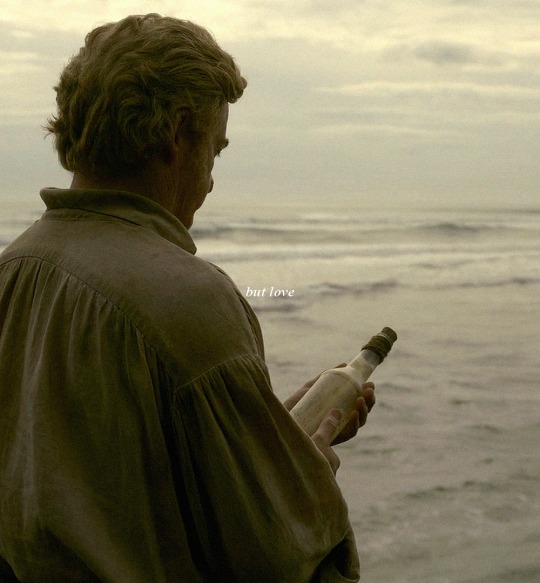
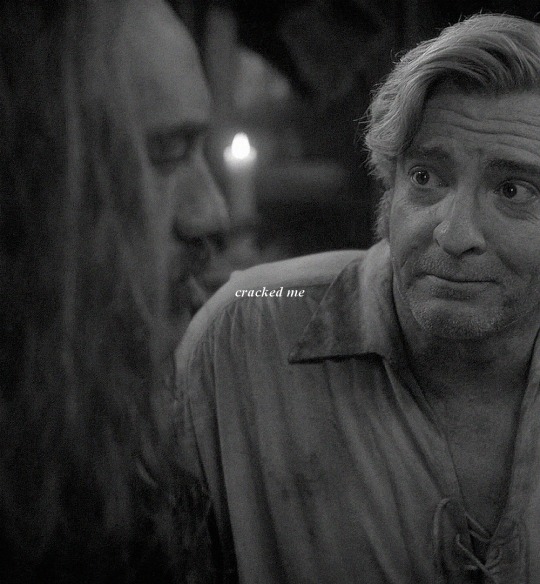

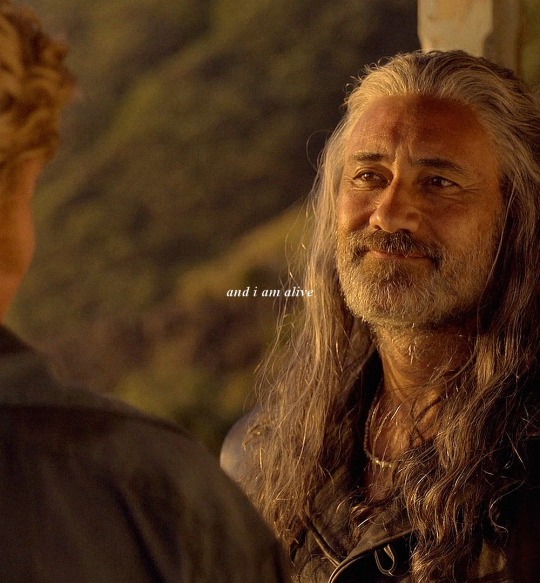
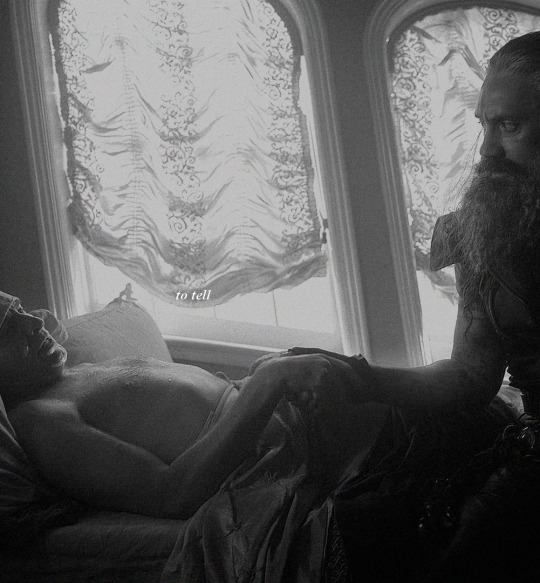

Denise Levertov, from “The Third Dimension”, Collected Earlier Poems, 1940-1960.
#ofmdedit#our flag means death#ofmd#ofmd s2#gentlebeard#ed x stede#edward teach#stede bonnet#mine#the WARMTH in the colours!!!
710 notes
·
View notes
Text

Shapiro Yakov Abramovich (1897-1972) "Self-Portrait." Dated to 1940s - 1950s Oil on canvas Size: 60.7 x 49.5 cm. In the lower left corner is the author's signature. Silaev's expertise.
SHAPIRO Yakov Abramovich (Alexandrovich) 18(6).06.1897 (Dvinsk, now Daugavpils, Latvia) - 1972 (Paris). Painter. Son of a woodcarver. He studied at art schools in Kharkiv (1915) and Kiev (1918). In 1919 he headed the drawing school in Ekaterinoslav (now Dnepropetrovsk). In 1921 he came to Petrograd, continued his studies at the State School of Artists and headed a children's art school. In the 1920s, he was engaged in scenography in Petrograd and Moscow theaters, designed productions by K. Village Stanislavsky, V. E. Meyerhold and E. B. Vakhtangov.
Participated in exhibitions: Art Bureau N. E. Dobychina (Pg., 1922), Paintings by Petrograd artists of all directions (Pg., 1923), group "United Art" (M., 1925). In 1925 he settled in Paris. He painted portraits, genre paintings and interiors. Since 1926 he has exhibited in salons: Autumn, Tuileries, Independent, Populiste, since 1935 - Super Independent. He held solo exhibitions in the galleries Kleinman (1930), Bonaparte (1936), the International Dance Archive (1937), de l'Elysee (1946); participated in exhibitions of Russian art in the galleries d'Alignan (1931) and Zak (1936; organized by the magazine "Our Union"), an exhibition organized by the Committee "France-USSR" of the The Museum of Gée de Pom purchased the painting "Vasilki" (1936). Performed lithographs for the book by D. Knut "From Abusive Poems" (Paris, 1949). In 1960, he published a book of memoirs about the life of the famous 1920s colony of artists "La Ruche". Contributed to the preservation of "La Ruche" when the building was going to be demolished.
Presented at the National Museum of Modern Art in Paris and at the Art Institute of Chicago. The investigated "Self-Portrait" belongs to the brush of one of the most interesting Russian artists of the Paris school, the inhabitant of the famous "Hive" Jacques Chapiro, whose work is only open to Russian lovers of fine arts. The investigated "Self-Portrait" is a wonderful work of the artist, powerfully and stylishly written in an expressive and complex manner. It should be noted the psychology, complex color and decorative structure of this work by Jacques Chapiro. Jacques Chapiro's work "Self-Portrait" is a valuable and rare work of the artist, which is of artistic and collectible value and can have museum significance. Silaev's expertise.
Kardashidi and Art-Souz
24 notes
·
View notes
Text
Some Kinda Love
Between thought and expression
Lies a lifetime
Situations arise
Because of the weather
And no kinds of love
Are better than others
Johnathan [Jack] Marleau 1940-2016

Artist born in LA joined the anti-war movement. Leaves LA when his lover is killed in Vietnam, joins the NYC leather community. Does covertly homoerotic paintings that sell for way too much. Has won Mr. Eagle New York multipule times most recently in 1986 where he was sent to Chicago to compete in International Mr. Leather. He did not win. Wears his keys on his left hip, flogger and red hanky in his back left pocket. [Later in life he wears handcuffs on the middle most beltloop in the back]
Mikey Squires 1960-199

Left small town Ohio when he was 16. Found a job in a record shop, he can’t think of something better to do. Don't let the shirt fool you, he cried hearing about the lawsuits following the Smith’s breakup. Joined the leather community almost by accident but was sold when he met Jack at The Eagle in 1984. The Eagle sent him as their representative to Chicago to compete in International Mr. Bootblack, which he won, in 1991 a year after his HIV diagnosis. He wears his keys on his right hip, a yellow hanky and a black hanky in his back right pocket.
Marcus Joseph 1994-2015

A photographer, born and raised in San Francisco, he hitch hiked across the country in 1969 to Woodstock, when he got back to San Francisco Queer Liberation was in full swing and he turned to photographing the community from Polk to Folsom. A freewheeling lover no one thought he would ever settle down. He was first runner up for International Mr. Leather in 1986. He wears his keys on his left hip, a black hanky and grey hanky in his back left pocket.
Callum [Cal] Nelson 1955-2016

Born in England, Callum, moved to San Francisco to study English at the University of California San Francisco. As a PhD student he publishes a collection of poems about queer masculinity. He soon gets a job at UC Berkeley and teaches classes for their queer studies program. He is introduced to the leather scene by a member of his cohort, and immediately meets and falls in love with Marcus. he is diagnosed HIV+ in 1987. He competes for, and wins International Mr. Leather in 1991, He and Marcus get married in 2013, Jack officiates the ceremony. He wears his keys on the right, a red hanky in his back left pocket and a light blue hanky in his right
Riley Williams 1945-1969

Born in LA Riley met Jack at an anti-war action. He doesn't know how he could have gotten so lucky when Jack kisses him the first time. unfortunately that’s where his luck runs out. When Jack brings the mail to the living room his face is sheet white as he hands Riley the letter on the top. Riley can’t open it he sees it’s from the selective service. He does not last a year in Vietnam.
#some kinda love#The way the two couples meet is there I just didn't wanna yknow write the whole thing#title of this world from the Velvet undgerground song of the same name#If that hadn't been it's title for like 8 months at this point id use a lyric from everybody wants to rule the world
3 notes
·
View notes
Text
Marriage under Mao Zedong and marriage under Sun Myung Moon

▲ Ding Ling in the 1930s. She was a famous Chinese author. After the Anti-Rightist Campaign in 1958, Ding was denounced and purged and was sent to exile in Manchuria, to be rehabilitated only in 1979. She died in Beijing in 1986. In 1936, Mao Zedong wrote and dedicated the poem "The Immortal from Linjiang" to her.
See below for Sun Myung Moon’s oath of loyalty, MY PLEDGE, and compare that with the loyalty expected in Mao’s Chinese Communist Party in the 1940s. In the Unification Church there were strict criteria to receive the “Holy Blessing of Marriage” from 1960 to around 1990 when the qualifications required gradually eased. Before that, minimum ages were set, and being active in a full time mission for three years was a requirement, etc. Strict criteria remain for the Japanese to attend. Financial contributions required.
Sun Myung Moon: “I understand communism well.” http://www.tparents.org/Moon-Books/SunMyungMoon-Life/SunMyungMoon-Life-05.htm
_________________________________
from Sinobabble by Edi Obiakpani-Reid, PhD.
https://www.youtube.com/watch?v=F9Y9DJLmn8s
Episode 16: The Communists at Yan'an (pt2): Life after Rectification
This episode will continue the theme of the Communists at Yan'an, switching focus to the lives of Party members and ordinary people under Chinese Communist Party rule.
Split over two parts, we will talk about the development and spread of Communist ideology and Mao Zedong thought, the institution of political campaigns aimed at increasing social cohesion and improving the lives of peasants, and the reaction of the Party to dissent. This week we discuss the fallout from the Rectification movement, and the effect it had on the social lives of political party members as well as ordinary people living in the Communist base area. We will also discuss the evolving role of art and propaganda, alongside the growing sentiment among party members that the collective should be paramount over the individual.
13:45
Finally, speaking about gender equality and sexual freedom, we can’t end this episode without discussing the fallout from the criticism about the treatment of younger cadres that we discussed last week.
China in the early 1940s
Last week we spoke about Ding Ling (丁玲) and Wang Shiwei’s (王实味) writings [Wild Lilies, 1942, Arrow and Target, etc.] on how young cadres felt weary [due to] maltreatment and the lack of opportunity to form meaningful connections – sexism and mistreatment of women and the inability of some cadres to find girlfriends, basically. Unfortunately the attitude towards relationships, particularly love relationships, developed in the opposite way from which many of these idealistic writers had hoped – and instead reflected the new norm of prioritizing the collective revolutionary movement above the self. The CCP imposed harsh restrictions on love and marriage. Basically outright banning the formation of romantic relationships for younger and lower level cadres and putting age restrictions on marriage. Now, marriage was very important in Chinese society. It was not common at all for people to freely fall in love, and have sex out of wedlock, and in the minds of many, traditional values still held sway over their private actions.
Getting married was seen as a major milestone and it meant that people could express their feelings, as well as relieve their desires in a socially appropriate manner. The restrictions were very hard on many young people who expressed their discontent privately in their journals, which showed their anxieties about possibly never finding a life partner. It affected men more than women, however, as many female cadres were more determined to delay marriage as traditional notions still prevailed, and they worried about losing their job and position if they ever had children. Unfortunately, some of them were married off to the older revolutionary cadres in the camps against their will, demonstrating that the CCP’s talk of gender equality was just that, talk. Female members of the party were treated as commodities or resources to be allocated. They were oggled by men who felt they couldn’t have them, and basically dished out to the higher-ups, which was exactly the thing that Wang Shiwei was complaining about in his essay. Funnily enough this actually still took the young men and women in the camp by surprise, because they felt that the revolutionary movement would allow them to marry freely to a partner of their choice, once they fell in love. But never fear, the party helped them to overcome these feelings by educating them to think of their feelings as reactionary bourgeois individualism which was hindering the success of the revolution, especially in light of the Japanese war effort. [The Japanese occupied a significant part of China until 1945. ref Kishi Nobusuke] How could people justify being so selfish when the nation itself was in jeopardy. Now this ideological education didn’t always sit right with the young cadres who still debated on the grounds of compassion and empathy. However, in many cases, this training was successful. There were some instances where love matches never progressed because one member of the pairing was worried about the class status of the other. For example, one woman named Shensha wrote in her diary that, “when I sometimes recall that I loved someone wholeheartedly, and whatever his purpose was he still loved me, I feel sad. I feel sad about the happiness that I saw after so hard and enjoyed for some time.” However, when it came down to her lover, Sha yi, actually proposing to her, she did not hesitate to place his political background above all else. “I cannot marry you, because I do not know you and your past. Being engaged means my life connects to that of a man forever and this is something I must think about carefully. As a party member I should pay attention to my own career and development.”
Other people who did get married were able to frame their match in light of the revolutionary struggle. As one couple wrote on their marriage application, “We fell in love with each other and want to get married. We promise that our work will not be affected by this, and we look forward to the party committee’s approval.”
The party committee replied, “We care about our veteran cadres and approve your application. We hope that you will attach greater importance to the party and make the party interest your top priority.” Some young cadres and party members did their best to deny their emotions altogether in order to prove, mainly to themselves, their loyalty to the party. For example, Jung Zejen, an Eighth Route Army cadre, wrote in his diary about his courtship of a young woman, her rejection of him and the conclusions he ultimately drew from this. “It was the first time in my life that I wrote a letter to a woman to reveal my love for her. It made me happy, but then frustrated. For two nights I could not even sleep.” When he received her rejection, he was tempted to keep pursuing her, but later changed his mind, “If this continues the work of the party and my studies will be affected, and that would be a big mistake. From now on, I will put this problem aside and work hard and study hard. Marriage issues can be easily resolved.” It was undeniable the psychological effects that these policies had on the young party members, in particular the young men who often [felt] a complete hopelessness when it came to the future prospects for happiness, and as we have seen tried to adopt some sort of asexuality. However, even though this experience was disheartening, and even painful for many of the young party members, in the end many people put the organizational goals of the party above their own desires, showing that the major aim of the [CCP] rectification movement to create ideological conformity among the ranks of cadres was ultimately successful.
So that’s it for this episode, and for what ended up being a miniseries on Yan’an.
Sinobabble.com
_________________________________
Loyalty to Sun Myung Moon and the Unification Church
My Pledge (1979)
1. As the center of the cosmos, I will fulfill our Father’s will (purpose of creation) and the responsibility given me (for self-perfection). I will become a dutiful son (or daughter), and a child of goodness to attend our Father forever in the ideal world of creation (by) returning joy and glory to Him. This I pledge.
2. I will take upon myself completely the Will of God to give me the whole creation as my inheritance. He has given me His Word, His personality, and His heart, and is reviving me who had died, making me one with Him and His true child. To do this, our Father has persevered for 6,000 years the sacrificial way of the cross. This I pledge.
3. As a true son (or daughter), I will follow our Father’s pattern and charge bravely forward into the enemy camp until I have judged them completely with the weapons with which He has been defeating the enemy Satan for me throughout the course of history by sowing sweat for earth, tears for man, and blood for heaven, as a servant but with a father’s heart in order to restore His children and the universe, lost to Satan. This I pledge.
4. The individual, family, society, nation, world, and cosmos who are willing to attend our Father, the source of peace, happiness, freedom, and all ideals, will fulfill the ideal world of one heart in one body by restoring their original nature. To do this, I will become a true son (or daughter), returning joy and satisfaction to our Father, and as our Father’s representative, I will transfer to the creation peace, happiness, freedom and all ideals in the world of the heart. This I pledge.
5. I am proud of the one Sovereignty, proud of the one people, proud of the one land, proud of the one language and culture centered upon God, proud of becoming the child of the One True Parent, proud of the family who is to inherit one tradition, proud of being a laborer who is working to establish the one world of the heart.
I will fight with my life.
I will be responsible for accomplishing my duty and mission.
This I pledge and swear.
This I pledge and swear.
This I pledge and swear.
_____________________________________
“Moon Sun-myung saw how Marxism gave his friends a utopian goal, a purpose, a historical role to play…”
“The organization of the Unification Church is so systematic that one thinks of communists.” – Professor Choi
The Moonie Washington P.R. Center, Richard Nixon and Capitol Hill
_____________________________________
Sun Myung Moon
: “So Master knows about Communists very well. And even under Japanese days, in Japan together with the Communists he fought against the Japanese government.”
History Of The Unification Church, part 2
Master Speaks December 28, 1971, Washington, D.C.
_____________________________________
Dear Leader's Paper Moon – Sun Myung Moon and North Korea
Unification Church Fund North Korean Missile Development for 450 billion yen
_____________________________________
Nobusuke Kishi was known as a monster, responsible for the deaths of thousands, and as a friend of Sun Myung Moon
Disciplining the Mind – North Korean style
_________________________________
https://en.wikipedia.org/wiki/Wang_Shiwei
https://en.wikipedia.org/wiki/Ding_Ling
In 1943, the rectification movement intensified and many more Communist Party members were purged. Ding Ling came under great pressure and was subject to disciplinary review. In 1945, the "Review Team's Preliminary Conclusions on Ding Ling's Historical Issues" stated: "There are materials to prove that there is no suspicion of Ding being dispatched by the Kuomintang. But whether the serious ideological problems during this period were affected by the softening of the Kuomintang after the arrest, Comrade Ding Ling deeply reflected on [herself]. After the rectification, there has been progress.” Thus she was spared.[13]
_________________________________
1 note
·
View note
Text
BOLLYWOOD’S 1536 BIGGEST BLOCKBUSTERS / BOX-OFFICE SMASHERS OF ALL TIME! (INDIES INFLATION-ADJUSTED WORLDWIDE GROSS COLLECTIONS IE. TICKET COUNT AT WORLDWIDE BOX OFFICE)! (1912 - 2022)
These are based on Indies guesstimates of inflation-adjusted worldwide box-office collections of Bollywood Films thru history! Once again incorporating & requiring a modicum of ‘shruti-knowledge’ in assessment. Enjoy, & imbibe, svp!
Advantage of Indie inflation adjusted guesstimate if so accept, is-
1.Eliminate huge skew from 21st c,with 500+ times tkt price.
2.V.IMP-Remove intermediary in process..
So bring all on level playing field-
MULTIPLYING NO OF TKTS SOLD AT WORLD BO WITH ONE TKT PRICE ACROSS THE BOARD.
Fair.
. .
Apt to acknowledge here, that Bollywood films of the 21st c., leave aside the (obvious) quality gap, would also suffer greatly at a systemic level, the new 'Mutiplex culture' being tailored for 1 week to 2-3 week runs at very best, naturally stunting even the potential for repetitive audience in large numbers, spread across several months, that contributed greatly to films of the 20th c., especially 60's & 70's, where witnessed b.o. at it's peak! This screening culture, as part of the vicious cycle of the new age, thus in turn also contributing to stunted artistic insight & outlook. And continue just the same, till major changes brought in at some level..
P.S. -
SOME STAR REPORTS CARDS & RANKING METERS, FOR FUN, BELOW!-
1. https://www.tumblr.com/indiejones/714836764871770112/bollywoods-70-most-popular-actors-actresses-of?source=share
2. https://www.tumblr.com/indiejones/709779127656448000/star-reports-at-the-indies-all-time-bollywood?source=share
.
.
.
AND HERE ARE THE 1536 MOST POPULAR BOLLYWOOD FILMS OF ALL TIME!
Position Title Year
1 Haathi Mere Saathi 1971
2 Do Raaste 1969
3 Disco Dancer 1982
4 Sachaa Jhutha 1970
5 Kati Patang 1970
6 Anand 1971
7 Aradhana 1969
8 Amar Prem 1972
9 Naseeb 1981
10 Jai Santoshi Maa 1975
11 Khamoshi 1969
12 Mehboob Ki Mehndi 1971
13 Daag: A Poem of Love 1973
14 Prem Kahani 1975
15 Shirdi Ke Sai Baba 1977
16 Bobby 1973
17 Ek Duuje Ke Liye 1981
18 Love Story 1981
19 Muqaddar Ka Sikandar 1978
20 Dilwale Dulhania Le Jayenge 1995
21 Parakh 1960
22 Hum Dono 1961
23 Shiraz 1928
24 Ziddi 1948
25 Pukar 1939
26 Agneepath 1990
27 Solwah Saal 1958
28 Anmol Ghadi 1946
29 Nau Do Gyarah 1957
30 Asli-Naqli 1962
31 Munimji 1955
32 Nadiya Ke Paar 1982
33 Dil Ek Mandir 1963
34 Bheegi Raat 1965
35 Maryada 1971
36 Hum Aapke Hain Koun..! 1994
37 Ram Teri Ganga Maili 1985
38 Khilona 1970
39 Karm 1977
40 Anurodh 1977
41 Prince 1969
42 Maya 1961
43 Balika Badhu 1976
44 Apna Desh 1972
45 The Train 1970
46 Bandhan 1969
47 Aan Milo Sajna 1970
48 Bawarchi 1972
49 Mehbooba 1976
50 Safar 1970
51 Kashmir Ki Kali 1964
52 Brahmachari 1968
53 Bhola Bhala 1978
54 Ajanabee 1974
55 Ramshastri 1944
56 Love in Simla 1960
57 Maine Pyar Kiya 1989
58 Aar-Paar 1954
59 Dil Apna Aur Preet Parai 1960
60 Chirag 1969
61 Ratan 1944
62 Teesri Manzil 1966
63 Kismet 1943
64 Doli 1969
65 Aap Ki Kasam 1974
66 Dushmun 1971
67 Ujala 1959
68 Phool Aur Patthar 1966
69 Shagird 1967
70 Dillagi 1949
71 Dil Deke Dekho 1959
72 Kaajal 1965
73 Maqsad 1984
74 Guide 1965
75 Jeewan Jyoti 1953
76 Khud-Daar 1982
77 Jagte Raho 1956
78 Joroo Ka Ghulam 1972
79 Panchayat 1958
80 Namak Haraam 1973
81 Asha Jyoti 1984
82 Andaz 1971
83 Khushboo 1975
84 Avam 1987
85 Angoor 1982
86 Barsaat 1949
87 Anarkali 1953
88 Nazrana 1987
89 Afsana 1951
90 Pagal 1940
91 Geet Gaata Chal 1975
92 Bhanvara 1944
93 Beti Bete 1964
94 Swarg 1990
95 Avtaar 1983
96 Ghunghat 1960
97 Dulhan 1958
98 Neel Kamal 1968
99 Chanda Aur Bijli 1969
100 Bahu Begum 1967
101 Godaan 1963
102 Gharana 1961
103 Jhuk Gaya Aasman 1968
104 Chaudhvin Ka Chand 1960
105 Sharaabi 1984
106 Kaho Naa... Pyaar Hai 2000
107 Aavishkar 1974
108 Meri Bahen 1944
109 Babul 1950
110 Baiju Bawra 1952
111 Teen Devian 1965
112 Aya Sawan Jhoom Ke 1969
113 Veerana 1988
114 Aan 1952
115 Adil-E-Jahangir 1955
116 Har Har Mahadev 1950
117 President 1937
118 Sajan 1969
119 Dus Lakh 1966
120 Umrao Jaan 1981
121 Dil Daulat Duniya 1972
122 Gora Aur Kala 1972
123 Ganwaar 1970
124 Mard 1985
125 Yaadon Ki Baaraat 1973
126 Sunghursh 1968
127 Mahakaal 1994
128 Hamraaz 1967
129 Heera Moti 1959
130 Aarti 1962
131 Prem Nagar 1974
132 Mere Jeevan Saathi 1972
133 Humshakal 1974
134 Prem Bandhan 1979
135 Naukri 1978
136 Batwara 1961
137 Ram Bhakta Hanuman 1948
138 Kabuliwala 1961
139 Qayamat Se Qayamat Tak 1988
140 Ankhen 1968
141 Coolie 1983
142 Saboot 1980
143 Hum Dil De Chuke Sanam 1999
144 Shaheed 1948
145 Dastaan 1972
146 Telephone Ni Taruni 1926
147 Chakravyuha 1978
148 Aakraman 1975
149 Khoon Bhari Maang 1988
150 Shehzada 1972
151 Majhli Didi 1967
152 Chetna 1970
153 Pyar Hi Pyar 1969
154 Street Singer 1938
155 Aashiq Hoon Baharon Ka 1977
156 Mera Saaya 1966
157 Souten 1983
158 Dil-E-Nadaan 1982
159 Rupaye Dus Karod 1991
160 Veer-Zaara 2004
161 New Delhi 1956
162 Budtameez 1966
163 Sant Tukaram 1936
164 Rajkumar 1964
165 Samadhi 1950
166 Bidyapati 1937
167 Khazanchi 1941
168 Purab Aur Pachhim 1970
169 Saheli 1965
170 Love in Tokyo 1966
171 Lamhe 1991
172 Chashme Buddoor 1981
173 Dil Tera Diwana 1962
174 Basant 1942
175 Chhoti Bahu 1971
176 Madhuri 1928
177 Aadmi 1968
178 Station Master 1942
179 Maalik 1972
180 Roti 1974
181 Amrit 1986
182 Palkon Ki Chhaon Mein 1977
183 Aurat 1940
184 Bluff Master 1963
185 Maha Chor 1976
186 Love 86 1986
187 Khandaan 1942
188 Ladki Sahyadri Ki 1966
189 Amrit Manthan 1934
190 Waqt 1965
191 Jewel Thief 1967
192 Baharon Ke Sapne 1967
193 Jodhaa Akbar 2008
194 Prithvi Vallabh 1943
195 Chor Machaye Shor 1974
196 Chand 1959
197 Bairaag 1976
198 Howrah Bridge 1958
199 Basant Bahar 1956
200 Anuraag 1972
201 Professor 1962
202 Pinjra 1972
203 Bundal Baaz 1976
204 Purani Haveli 1989
205 Phagun 1958
206 Barsaat Ki Raat 1960
207 Do Ankhen Barah Haath 1957
208 Patthar Ke Sanam 1967
209 Nagin 1954
210 Raja Rani 1973
211 Mahal 1949
212 Shahjehan 1946
213 Baharon Ki Manzil 1968
214 Haseena Maan Jayegi 1968
215 Mere Mehboob 1963
216 Namak Halaal 1982
217 Raj Hath 1956
218 Biraj Bahu 1954
219 Chhaya 1961
220 Naya Daur 1957
221 Bhakta Surdas 1942
222 Vidya 1948
223 Satta Bazaar 1959
224 Utsav 1984
225 Ajooba Kudrat Ka 1991
226 Biwi Aur Makan 1966
227 Aashirwad 1968
228 Bharat Milap 1942
229 Bhakta Kabir 1942
230 Shri Chaitanya Mahaprabhu 1954
231 Kala Pani 1958
232 Aah 1953
233 Parineeta 1953
234 Mughal-E-Azam 1960
235 Seeta Aur Geeta 1972
236 Aaye Din Bahar Ke 1966
237 Shahenshah 1988
238 Padosi 1941
239 Julie 1975
240 Munna Bhai M.B.B.S. 2003
241 Ittefaq 1969
242 Pyar Kiye Jaa 1966
243 Darwaza 1978
244 Gunga Jumna 1961
245 Sawan Ko Aane Do 1979
246 Roop Tera Mastana 1972
247 Andhera 1975
248 Kudrat 1981
249 Saraswatichandra 1968
250 Satyamev Jayate 1987
251 Junglee 1961
252 Mera Gaon Mera Desh 1971
253 Achhut Kanya 1936
254 Caravan 1971
255 Jo Jeeta Wohi Sikandar 1992
256 Janta Hawaldar 1979
257 Madhosh 1951
258 Rajput 1982
259 Pati Patni Aur Woh 1978
260 Dharam Kanta 1982
261 Chhailla Babu 1977
262 Gehra Daag 1963
263 Tere Ghar Ke Samne 1963
264 Nausherwan-E-Adil 1957
265 Chalti Ka Naam Gaadi 1958
266 Gopal Krishna 1979
267 Pyaasa 1957
268 Do Gaz Zameen Ke Neeche 1972
269 Qaidi 1984
270 Hukumat 1987
271 Jis Desh Men Ganga Behti Hai 1960
272 Chakradhari 1954
273 Ek Shriman Ek Shrimati 1969
274 Tohfa 1984
275 Alibaba and 40 Thieves 1954
276 Pyar Jhukta Nahin 1985
277 Shaan 1980
278 Telephone 1985
279 Aage Ki Soch 1988
280 Lahore 1949
281 Karishma Kudrat Kaa 1985
282 Yeh Rastey Hain Pyar Ke 1963
283 Funtoosh 1956
284 Veer Ghatotkach 1949
285 Sati Sulochana 1969
286 Agar Tum Na Hote 1983
287 Rajnigandha 1974
288 Dekh Kabira Roya 1957
289 Krishna Bhakt Sudaama 1968
290 Subah Ka Tara 1954
291 Gopal Krishna 1938
292 Darogaji 1949
293 Hatyara 1977
294 Naya Bakra 1979
295 Shadi Se Pahale 1980
296 Lalkar (The Challenge) 1972
297 Shrimanji 1968
298 Rakshaa Bandhan 1976
299 Jaani Dushman 1979
300 Dard (Conflict of Emotions) 1981
301 Bandh Darwaza 1990
302 Satyakam 1969
303 Nartaki 1940
304 Achhut 1939
305 Khol De Meri Zuban 1989
306 College Girl 1960
307 Samson 1964
308 Matwala Shair Ramjoshi 1947
309 Garam Coat 1955
310 Do Dil 1966
311 Yakeen 1969
312 Sawan Ki Ghata 1966
313 Raj Tilak 1959
314 Tamanna 1969
315 Bachpan 1970
316 Kalyug Aur Ramayan 1987
317 Aahuti 1978
318 Sone Ka Dil Lohe Ke Haath 1978
319 Waris 1954
320 Ankhiyon Ke Jharokhon Se 1978
321 Raadha Aur Seeta 1979
322 Bees Saal Baad 1962
323 Bahurani 1964
324 Suhagan 1964
325 Solva Sawan 1979
326 Devdas 1936
327 Namoona 1949
328 Yahan Wahan 1984
329 Shair 1949
330 Katha 1983
331 Aage Badho 1947
332 Taaqat 1982
333 Chandni 1989
334 Sanjog 1943
335 Pati Bhakti 1922
336 Deewana 1992
337 Elan 1947
338 Mirza Ghalib 1954
339 Doctor 1940
340 Afsar 1950
341 Chandidas 1934
342 Paying Guest 1957
343 Bazar 1949
344 Apna Desh 1949
345 Halla Gulla 1954
346 Sadma 1983
347 Kamar-Al-Zaman 1931
348 Shirin Farhad 1931
349 Baadbaan 1954
350 Haqeeqat 1964
351 Nadaan 1951
352 Paraya Ghar 1989
353 Nagma-E-Sahra 1945
354 Hum 1991
355 Nauker 1979
356 Pakeezah 1972
357 Kissise Na Kehna 1983
358 Nagin Aur Suhagan 1979
359 Hum Kisise Kum Naheen 1977
360 Balak Aur Janwar 1975
361 Archana 1974
362 Ek Thi Larki 1949
363 Griha Pravesh 1979
364 Ra Kawat 1926
365 Khudgarz 1987
366 Jadugar 1946
367 Nakhrewali 1960
368 Gaon Ki Gori 1945
369 Awaara 1951
370 Jalan 1948
371 Kisan Kanya 1937
372 Parichay 1972
373 Shatranj Ke Khilari 1977
374 Insaaf Main Karoonga 1985
375 Indian 1996
376 Aakhri Cheekh 1991
377 Jamaibabu 1931
378 Sholay 1975
379 Agent Vinod 1977
380 Dil Kaa Heera 1979
381 Tinku 1977
382 Ek Gaon Ki Kahani 1957
383 Mai Baap 1957
384 Waman Avtar 1955
385 C.I.D. 1956
386 Jai Bhawani 1947
387 Damaad 1951
388 Khatta Meetha 1978
389 Masterji 1985
390 Chhabila 1955
391 Do Aur Do Paanch 1980
392 Upkar 1967
393 Rangeela Raja 1960
394 Baghdad Ki Raaten 1962
395 Nayakan 1987
396 Nawab Sahib 1978
397 Ranga Khush 1975
398 Bhartrahari 1944
399 Khooni Katar 1931
400 Kaamchor 1982
401 Boot Polish 1954
402 Pratiggya 1975
403 Victoria No. 203 1972
404 Insaf Ki Pukar 1987
405 Shola Aur Shabnam 1992
406 Main Tulsi Tere Aangan Ki 1978
407 36 Ghante 1974
408 Gol Maal 1979
409 Dr. Vidya 1962
410 Naya Zamana 1971
411 Sant Tulsidas 1939
412 Khubsoorat 1980
413 Sasural 1961
414 Tumhara Kalloo 1975
415 Kismat 1969
416 Adhikar 1986
417 Pannadai 1945
418 Inspector Eagle 1979
419 Bahar 1951
420 Chowkidar 1974
421 Muraliwala 1927
422 Dhool Ka Phool 1959
423 Mahabharat 1965
424 Indrasabha 1932
425 Pooja 1940
426 Dharmatma 1935
427 Devdas 1935
428 3D Saamri 1985
429 Panna 1944
430 Dak Ghar 1965
431 Aadmi Aur Insaan 1969
432 Maa 1957
433 Charitraheen 1974
434 Apne Rang Hazaar 1975
435 Pujarin 1969
436 Apne Dushman 1975
437 Gharwali Baharwali 1988
438 Dhoop Chhaon 1935
439 Chaani 1977
440 Bulbule Parastan 1926
441 Adventures of Aladdin 1978
442 Mere Hamdam Mere Dost 1968
443 Dosti 1946
444 Biwi Ho To Aisi 1988
445 Ustaad 1989
446 Aulad 1987
447 Chupke Chupke 1975
448 Vismi Sadi 1924
449 Naya Din Nai Raat 1974
450 Jeet 1949
451 Shri Krishna Leela 1971
452 Stree 1961
453 Krodhi 1981
454 Hanumaan Pataal Vijay 1951
455 Noorjehan 1967
456 Aaya Toofan 1964
457 Sikandar 1941
458 Anjali 1990
459 Nirali Duniya 1940
460 Baton Baton Mein 1979
461 Tansen 1943
462 Kabhi Khushi Kabhie Gham... 2001
463 Kohraa 1964
464 Pyar Ka Mausam 1969
465 Aasha 1980
466 Andaz Apna Apna 1994
467 Purana Mandir 1984
468 Gateway of India 1957
469 College Girl 1978
470 Rukmini Swayamvar 1946
471 Ram Rajya 1943
472 Kab? Kyoon? Aur Kahan? 1970
473 Kashinath 1943
474 Narsi Bhagat 1940
475 Baghi Sipahi 1958
476 Solah Shukrawar 1977
477 Purana Purush
478 Satyam Shivam Sundaram: Love Sublime 1978
479 Hum Dono 1985
480 Prem Geet 1981
481 Do Bigha Zamin 1953
482 Choron Ka Chor 1970
483 Chandi Sona 1977
484 Pyar Ka Devta 1990
485 Dak Bangla 1987
486 Aankh Ka Tara 1978
487 Call Girl 1974
488 Awara Ladki 1975
489 Do Sitare 1951
490 Main Intequam Loonga 1982
491 Gharaonda 1977
492 Amrit 1941
493 Baazigar 1959
494 Bhabhi 1957
495 Sangeet Samrat Tansen 1962
496 Jhansi Ki Rani 1953
497 Mahal 1970
498 Jagriti 1955
499 Kala Pahad 1927
500 Nadiya Ke Paar 1948
501 Kathputli 1971
502 Foot Path 1953
503 Dus Numbri 1976
504 Manzil 1936
505 Aag 1948
506 Albela 1951
507 Char Minar 1956
508 Baghdad 1952
509 Babu 1985
510 Chirag Kahan Roshni Kahan 1959
511 Tere Mere Beech Mein 1984
512 Andheri Raat Mein Diya Tere Haath Mein 1986
513 Paapi 1977
514 Dekha Pyaar Tumhara 1963
515 Haré Rama Haré Krishna 1971
516 Dr. Madhurika 1935
517 Udhaar 1949
518 Pak Daman 1940
519 Pocket Maar 1956
520 Heera Panna 1973
521 Hotel 1981
522 Mohini 1940
523 Mahaadev 1989
524 Swarag Se Sunder 1986
525 Raat Ke Rahi 1959
526 Sannata 1981
527 Saajan Ki Saheli 1981
528 Bin Phere Hum Tere 1979
529 Kapalkundala 1929
530 Mazdoor Zindabaad 1976
531 Mera Naam Joker 1970
532 Amar 1954
533 Pagal Premi 1926
534 Taxi Driver 1954
535 Prapanch Pash 1929
536 Raja Saab 1969
537 Sati Padmini 1924
538 Ghar Ek Mandir 1984
539 Shola Jo Bhadke 1961
540 Hariyali Aur Rasta 1962
541 Azadi Ki Raah Par 1948
542 Naram Garam 1981
543 Ham Sab Chor Hain 1956
544 Jab Jab Phool Khile 1965
545 Shandar 1990
546 Dushman 1938
547 Pardesi 1993
548 Anari 1959
549 Jeevan Prabhat 1937
550 Majaal 1987
551 Pyar Mohabbat 1966
552 Inspector Dhanush 1991
553 Shaitani Ilaaka 1990
554 Kanoon 1960
555 Madhumati 1958
556 Marte Dam Tak 1987
557 Muqaddar Ka Faisla 1987
558 Lakshmi Narayan 1951
559 Alam Ara 1931
560 Imaan 1974
561 Agni Rekha 1973
562 Angaarey 1975
563 Do Ladkiyan 1976
564 Bahadur 1944
565 Khel 1950
566 Khel Khel Mein 1975
567 Rang Birangi 1983
568 Dil Aur Patthar 1977
569 C.I.D. 1990
570 Dillagi 1942
571 Shabistan 1951
572 Garam Khoon 1980
573 Jagmagati Jawani 1930
574 Kaalia 1981
575 Rang 1993
576 Resham Ki Dori 1974
577 Mili 1975
578 Main Awara Hoon 1983
579 Guest House 1980
580 Pyar Hua Chori Chori 1992
581 No Entry 2005
582 Anari No. 1 1999
583 Khal Nayak 1993
584 Zimbo Shaher Mein 1960
585 Life's for Living: Aadmi 1939
586 Chhoti Si Baat 1976
587 Pushpaka Vimana 1987
588 Haisiyat 1984
589 Sampoorna Ramayana 1961
590 Gunahon Ka Devta 1990
591 Mahatma Vidur 1943
592 Jahan Sati Wahan Bhagwan 1965
593 Lal Haveli 1944
594 Rangila 1953
595 Baazi 1984
596 Sitamgar 1985
597 Saath Saath 1982
598 Yalgaar 1992
599 Buddha Mil Gaya 1971
600 Nastik 1954
601 Bees Saal Pehle 1972
602 Raja Babu 1994
603 Safed Jhoot 1978
604 Jaal 1952
605 Hukum ka ekka 1964
606 Minoo 1977
607 Naache Mayuri 1986
608 Mangu Dada 1970
609 Geet Gaaya Pattharon Ne 1964
610 Chitralekha 1941
611 Saathi 1968
612 Kirayadar 1986
613 Jurm 1990
614 Raahee 1987
615 Ek Phool Do Mali 1969
616 Manchali 1973
617 Shalimar 1978
618 Muflis Ashaq 1932
619 Ashiana 1952
620 Yahudi 1958
621 Jugnu 1973
622 Kalyug 1981
623 Kali Ghata 1980
624 Zindagi 1976
625 Patita 1953
626 Ravan Raaj: A True Story 1995
627 Chandni 1942
628 Oonche Log 1965
629 Boy Friend 1961
630 Diler Hasina 1960
631 Loafer 1973
632 Ishq Par Zor Nahin 1970
633 Vishwatma 1992
634 Actress 1948
635 Suhaag 1979
636 Judaai 1980
637 Pyar Ka Sapna 1969
638 Taqdeer 1967
639 Goraa 1987
640 Koshish 1972
641 Mujhe Insaaf Chahiye 1983
642 Begaanaa 1986
643 Dil Hi To Hai 1963
644 Arzoo 1965
645 Love Marriage 1959
646 Karan Arjun 1995
647 Aflatoon 1951
648 Talaashi 1996
649 Bewafai 1985
650 Khoj 1989
651 Watan Ke Rakhwale 1987
652 Bandish 1980
653 Sikandar E Azam 1965
654 Padosi 1971
655 Dil 1990
656 Vaastav: The Reality 1999
657 Man Tera Tan Mera 1971
658 Baazigar 1993
659 Badla Aur Balidan 1980
660 Munnibai 1999
661 Chandidas 1927
662 Dharti 1970
663 Paar 1984
664 Mafia Raaj 1998
665 Chacha Zindabad 1959
666 Madadgaar 1987
667 Samrat Prithviraj Chauhan 1959
668 Police Public 1990
669 Dhoop Chhaon 1977
670 Jab Se Tumhe Dekha Hai 1963
671 Kavi Kalidas 1959
672 Daulat 1982
673 Sawan Ke Geet 1978
674 Tu Nahin Aur Sahi 1960
675 Dhoti Lota Aur Chowpatty 1975
676 Rajrani Meera 1933
677 Hamrahi 1963
678 Paap Ka Ant 1989
679 Janbaaz 1986
680 Bharat Ka Lal 1936
681 Nagin 1976
682 Kala Bazar 1960
683 Jahan Pyar Miley 1969
684 Hyderabad Ki Nazneen 1952
685 Oonchi Haveli 1955
686 Phir Subha Hogi 1958
687 Zindagi 1940
688 Sindoor 1987
689 Seema 1955
690 Zamana 1985
691 Ghungroo Ki Awaaz 1981
692 Tahkhana 1986
693 Naya Kadam 1984
694 Guddi 1971
695 Sadhna 1958
696 Pyar Ka Karz 1990
697 Heer Raanjha 1970
698 Ardhangini 1959
699 Rishte Naahte 1965
700 Prem Kahani 1937
701 Prem Pujari 1970
702 Bhole Bhale 1950
703 Shaheed 1965
704 Raja Bhaiya 2003
705 Prem Nagar 1940
706 Adhikar 1971
707 Jhanak Jhanak Payal Baaje 1955
708 Sohag Raat 1948
709 Itihaas 1987
710 Jhoola 1941
711 Patanga 1949
712 Agni Pareeksha 1981
713 Sangam 1964
714 Raj Mahal 1982
715 Maha-Sangram 1990
716 Tarana 1951
717 Hurricane Special 1939
718 Mohan 1947
719 Hungama 1971
720 Hero 1983
721 Censor 2001
722 Mission Kashmir 2000
723 Souten Ki Beti 1989
724 Jwar Bhata 1973
725 Sharara 1984
726 Begunaah 1991
727 Mausam 1975
728 Karwane Hayat 1935
729 Mohabbat Zindagi Hai 1966
730 Main Azaad Hoon 1989
731 Bhakt Raj 1960
732 Beti 1957
733 Mr. and Mrs. Bombay 1936
734 House No. 44 1955
735 Dalaal 1993
736 Jawan Muhabat 1971
737 Bhanwar 1976
738 Aankhen 1993
739 Sandwich 2006
740 Insaan 1982
741 Yaarana 1981
742 Do Sholay 1977
743 The Modern Girl 1935
744 Sunehra Sansar 1975
745 Sasurvaas 1946
746 Paap Ki Duniya 1988
747 Pati Patni Aur Tawaif 1990
748 Hum Bhi Insaan Hain 1948
749 Half Ticket 1962
750 Gopinath 1948
751 Dharti Mata 1938
752 Khuda Gawah 1992
753 Raaz 1967
754 Zindagi 1964
755 Khuni Khanjar 1930
756 Daulat Ke Dushman 1983
757 Ashanti 1982
758 Tum Haseen Main Jawan 1970
759 Mr. Natwarlal 1979
760 Mumtaz Mahal 1944
761 Gumrah 1993
762 Naseeb 1998
763 Naukari 1955
764 Pukar 1983
765 Aur Kaun? 1979
766 Kabhie Kabhie 1976
767 Nafrat Ki Aandhi 1989
768 Vijay 1988
769 Geet 1970
770 Dil Hai Ki Manta Nahin 1991
771 Zakhmi Sipahi 1995
772 Border 1997
773 Saajan Bina Suhagan 1978
774 Shri Ganesh Mahima 1950
775 Honeymoon 1973
776 Noorie 1979
777 Chal Chal Re Navjavan 1944
778 Dhanwan 1981
779 Rustom Sohrab 1967
780 Taj Mahal 1963
781 Punjab Mail 1929
782 Bhamto Bhut 1926
783 Inquilaab 1984
784 Dawat 1974
785 Jai Mahadev 1955
786 Yauvan Chakra 1926
787 Kunwara Baap 1974
788 Shararat 1959
789 Roti Kapada Aur Makaan 1974
790 Saajan 1991
791 Shravan Kumar 1984
792 Bachao - Inside Bhoot Hai... 2010
793 Yehi Hai Zindagi 1977
794 Intaquam 1969
795 Mukti 1937
796 Das Baje 1942
797 Nagina 1986
798 Kaaranama 1990
799 Abhimaan 1957
800 Dahshat 1981
801 Senapati 1961
802 Lucky Number 1961
803 Gunda 1998
804 Jeene Ki Raah 1969
805 Mohabbat Ki Kasam 1986
806 Naach Govinda Naach 1992
807 Deewaar 1975
808 Aakhree Raasta 1986
809 Awwal Number 1990
810 Angaara 1996
811 Jaadugar 1989
812 Hum Hain Rahi Pyar Ke 1993
813 Roti Kee Keemat 1990
814 Ek Sapera Ek Lutera 1965
815 Hum Se Na Takrana 1990
816 Sikandar Sadak Ka 1999
817 Tumhari Kasam 1948
818 Samraat 1982
819 Haseena Maan Jaayegi 1999
820 Raate Ke Andhere Mein 1969
821 Beta Ho To Aisa 1994
822 Padosan 1968
823 Heera Lal Panna Lal 1999
824 Cinema Ki Rani 1925
825 Badnam Farishte 1971
826 Aakhri Adaalat 1988
827 Mawaali 1983
828 Mohabbat Ke Aansu 1932
829 Baharen Phir Bhi Aayengi 1966
830 Jaan Se Pyaara 1992
831 Nirbhay 1996
832 Daya Ni Devi 1927
833 Sipahsalar 1956
834 Anaar 1986
835 Do Chor 1972
836 Geraftaar 1985
837 Farishtay 1991
838 Ghutan 2007
839 Sanjog 1961
840 Shandaar 1974
841 Goonj 1952
842 Dil To Pagal Hai 1997
843 Oh Bewafa 1980
844 Bhule Bhatke 1952
845 Deewar 1955
846 Qurbani 1980
847 Ek Se Badhkar Ek 1976
848 Milap 1955
849 Suraj 1966
850 Ram Aur Shyam 1967
851 Wazir E Azam 1961
852 Anokhi Ada 1948
853 Maze Le Lo 1975
854 Aaj Ka Daur 1985
855 Singhasan 1986
856 Ab Ayega Mazaa 1984
857 Raj Rang 1928
858 Pyar Ka Mandir 1988
859 Milan 1967
860 Barood 1976
861 Biwi-O-Biwi 1981
862 Prem Rog 1982
863 Tigress 1948
864 Duniya Hai Dilwalon Ki 1966
865 Jagat Mohini 1940
866 Jodi No. 1 2001
867 Lagan 1941
868 Pet Pyaar Aur Paap 1984
869 Karma 1986
870 Sharmeelee 1971
871 Dharm Aur Qanoon 1984
872 Hey Ram 2000
873 Mere Apne 1971
874 Ganga Maang Rahi Balidan 1981
875 Dharti Kahe Pukar Ke 1969
876 Ek Nannhi Munni Ladki Thi 1970
877 Kasam Suhag Ki 1989
878 Duniya Na Mane 1938
879 Madam Zapatta 1962
880 Dhake Ki Malmal 1956
881 Zalzala 1988
882 Kyo Kii... Main Jhuth Nahin Bolta 2001
883 Actor 1950
884 Sheikh Chilli 1956
885 Apne Paraye 1980
886 Prithvi Putra 1926
887 Gamdeni Gori 1927
888 Aag Hi Aag 1987
889 Waaris 1988
890 Dhiraj 1942
891 Raagini 1958
892 New Delhi 1987
893 Saajan Chale Sasural 1996
894 Bombai Ka Babu 1960
895 Bharat Ramani 1930
896 Manzil 1960
897 Aashiq 1962
898 Samrat Shiladitya 1926
899 Suryaa: An Awakening 1989
900 Akashganga 1959
901 Gangaa Jamunaa Saraswathi 1988
902 Hanste Khelte 1984
903 Khoon Ka Karz 1991
904 Ustad 1957
905 Sehra 1963
906 Prabhu Ki Maya 1955
907 Karodpati 1936
908 Dharmatma 1975
909 Watan 1954
910 Saagar 1985
911 Dekha Pyar Tumhara 1985
912 Son of India 1962
913 Sitapur Ki Geeta 1987
914 Aadhi Roti 1957
915 Gunda 1969
916 Uljhan 1975
917 Gunehgaar 1939
918 Dharam Sankat 1991
919 Angaaray 1986
920 Azad Hindustan 1948
921 Romance 1983
922 Paraya Dhan 1971
923 Achanak 1998
924 Ganga Ki Kasam 1998
925 Ssukh 2005
926 Kath Putli 1957
927 Jaanwar 1982
928 Bhole Piya 1949
929 Jai Dwarkadheesh 1977
930 Aandhi 1975
931 Veer Parshuram 1978
932 Ram Bharose 1977
933 Red Rose 1980
934 Ghar Ki Izzat 1949
935 Sampoorna Santoshi Maa Ki Mahima 1981
936 Ram Balram 1980
937 Kali Ganga 1990
938 Yamraaj 1998
939 Tan-Badan 1986
940 Mohar 1959
941 Raaj Tilak 1984
942 Chauranghee 1942
943 Shikar 1968
944 Police Aur Mujrim 1992
945 Hatyara 1998
946 Aakhri Khat 1966
947 Lage Raho Munna Bhai 2006
948 Bewaqoof 1960
949 Batwara 1989
950 Daku Aur Mahatma 1977
951 Muqaddar Ka Badshaah 1990
952 Phir Wohi Raat 1980
953 Lekin... 1990
954 Pyar Ke Naam Qurban 1990
955 Tumse Achha Kaun Hai 1969
956 Maa 1992
957 Neend Hamari Khwab Tumhare 1966
958 Dhan Daulat 1980
959 Sinhagad 1923
960 Mem-Didi 1961
961 Dholak 1951
962 Mere Huzoor 1968
963 Bilwamangal 1932
964 Ek Hi Raasta 1939
965 Bakhshish 1950
966 Mard Ki Zabaan 1987
967 Himmatwala 1998
968 Salma 1985
969 Sheesh Mahal 1950
970 Shatranj 1969
971 Bank Manager 1959
972 Durgaa 1985
973 Tangewala 1972
974 Pardesi Babu 1998
975 Grama Kanya 1936
976 Sant Janabai 1949
977 Nai Roshni 1967
978 Lakhpati 1991
979 Jungle Princess 1942
980 Karmayogi 1978
981 Haar Jeet 1972
982 Karz Chukana Hai 1991
983 Patit Pawan 1933
984 Shaukeen 1949
985 Jaag Utha Insan 1984
986 Pushpanjali 1970
987 Palki 1967
988 Balam 1949
989 Vardi 1989
990 Jogan 1950
991 Bandhan Kuchchey Dhaagon Ka 1983
992 Veer Durgadas 1960
993 Navrang 1959
994 Socha Na Tha 1989
995 Bhagam Bhag 2006
996 Star 1982
997 College Girl 1990
998 Rocky 1981
999 Khush Rado 1949
1000 Bahadur Jeevan 1948
1001 Mohabbatein 2000
1002 Safdar Jung 1930
1003 Sapne Suhane 1961
1004 Ek Aur Ek Gyarah 1981
1005 Ek Aur Ek Gyarah: By Hook or by Crook 2003
1006 Arzoo 1950
1007 Devdas 1928
1008 Anamika 1973
1009 Mard 1998
1010 Jodidar 1997
1011 Ayee Milan Ki Bela 1964
1012 Char Aankhen 1946
1013 Krishnaavtar 1964
1014 Vanasundari 1951
1015 Grahasti 1948
1016 Dost 1944
1017 Duniya Ek Tamasha 1942
1018 Imtihan 1974
1019 The Burning Train 1980
1020 Amar Jyoti 1936
1021 Sadak 1991
1022 Ganesh Janma 1930
1023 Ji Haan 1945
1024 Aaj Ka Arjun 1990
1025 Dhola Maru 1956
1026 Karwa Chouth 1978
1027 Aakhir Kyon? 1985
1028 Paisa Ya Pyar 1969
1029 Salaam Mem Saheb 1961
1030 Woh Phir Aayegi 1988
1031 Shikari 1932
1032 Jaane-Anjaane 1971
1033 Azaad 1955
1034 Gadar: Ek Prem Katha 2001
1035 Main Kya Karun 1945
1036 Pathan 1962
1037 Phaansi 1978
1038 Aandhiyan 1952
1039 11 O'Clock 1948
1040 Kar Bhala 1956
1041 Lakhon Ki Baat 1984
1042 Tulsi 1985
1043 Typist Girl 1926
1044 Toorkey Hoor 1924
1045 Darr 1993
1046 Kaala Patthar 1979
1047 Sher-E-Hindustan 1997
1048 Madhuri 1932
1049 Kanyadaan 1968
1050 Chachi 420 1997
1051 Dukh Sukh 1942
1052 Bazaar 1982
1053 Mohabbat Ke Dushman 1988
1054 Khamosh 1986
1055 Shatru 1986
1056 Sanam Teri Kasam 1982
1057 Dil Diya Dard Liya 1966
1058 Pujarin 1936
1059 Gaon Hamara Shaher Tumhara 1972
1060 Aalavandhan 2001
1061 Swarg Narak 1978
1062 Kal Aaj Aur Kal 1971
1063 Manoranjan 1974
1064 Hathyar 1989
1065 Nakli Nawab 1962
1066 Surekha Haran 1921
1067 Phool Bane Angaare 1963
1068 Qatl 1986
1069 Chhupa Chhuppi 1981
1070 Jeeo Aur Jeene Do 1982
1071 Chhota Jawan 1963
1072 Khuda Kasam 1981
1073 Haath Ki Safai 1974
1074 Bin Baap Ka Beta 1979
1075 Jaani Dost 1983
1076 Sur Sangam 1985
1077 Paap Ki Kamaee 1990
1078 Do Gunde 1959
1079 Barsaat 1995
1080 Bari Behen 1949
1081 Passing Show 1956
1082 Fiffty Fiffty 1981
1083 Road No. 303 1960
1084 Arab Ka Sona: Abu Kaalia 1979
1085 Dil Aur Mohabbat 1968
1086 Hong Kong 1962
1087 Rocky Mera Naam 1973
1088 Johar Mehmood in Hong Kong 1971
1089 Masoom 1960
1090 Sindbad the Sailor 1952
1091 Sajan Ka Ghar 1948
1092 Salaakhen 1975
1093 Nagin Aur Sapera 1966
1094 Main Shadi Karne Chala 1962
1095 Labela 1966
1096 Pyaar Ki Raat 1949
1097 Azaad Desh Ke Gulam 1990
1098 Aatish 1979
1099 Ram Lila 1961
1100 Hunterwali 1935
1101 Muqaddar 1978
1102 Naukar Biwi Ka 1983
1103 Indira M.A. 1934
1104 Paap Ko Jalaa Kar Raakh Kar Doonga 1988
1105 Bhai-Bhai 1956
1106 Bhakta Vidur 1922
1107 Juari 1968
1108 Ghar Ghar Ki Kahani 1970
1109 Kaala Sona 1975
1110 Patthar Ke Phool 1991
1111 Apne Dam Par 1996
1112 Rocket Girl 1962
1113 Kartavya 1979
1114 Badmash 1969
1115 Chhote Sarkar 1996
1116 Gambler 1995
1117 Trishul 1978
1118 Nishchaiy 1992
1119 Waqt Ka Badshah 1992
1120 Ustadon Ke Ustad 1963
1121 Maarg 1992
1122 Dastan 1950
1123 Professor Pyarelal 1981
1124 Kasam Khoon Ki 1977
1125 Zameen Ke Tare 1960
1126 Joker 1949
1127 Thodisi Bewafaii 1980
1128 Raja Jani 1972
1129 Karmyudh 1985
1130 Makkhee Choos 1956
1131 Bahadur Kisan 1938
1132 Ghulami 1985
1133 Basant 1960
1134 Dilavar 1984
1135 Elaan 1971
1136 Jail Yatra 1981
1137 Katil Katar 1935
1138 Divorce 1984
1139 Jaan Hatheli Pe 1986
1140 Gair Kaanooni 1989
1141 Dil Hai Tumhaara 2002
1142 Devta 1998
1143 Desh Drohi 2008
1144 Aadmi Khilona Hai 1993
1145 Loha 1987
1146 Maya Bazaar 1932
1147 Adhikar 1938
1148 Kahani Kismat Ki 1973
1149 Anokha Milan 1972
1150 The Don 1995
1151 Badi Maa 1945
1152 Sweety 1981
1153 Rakhwala 1971
1154 Apnapan 1977
1155 Roop Lekha 1949
1156 Yeh Desh 1984
1157 Hatya 1988
1158 Blackmail 1973
1159 Aa Ab Laut Chalen 1999
1160 Humshakal 1992
1161 Jung 1996
1162 Teesra Kaun 1965
1163 Balidan 1927
1164 Bhagam Bhag 1956
1165 Jallaad 1995
1166 Coolie No. 1 1995
1167 Amar Akbar Anthony 1977
1168 Mahaveera 1988
1169 Achchhaji 1950
1170 Dayavan 1988
1171 Tarkeeb 1984
1172 Jaaye To Jaaye Kahan 1980
1173 Aalha Udal 1962
1174 Sachai Ki Taqat 1989
1175 Pagla Kahin Ka 1970
1176 Adhikar 1954
1177 Saudagar 1991
1178 Mala the Mighty 1948
1179 Woh Kaun Thi? 1964
1180 Chudiyan 1942
1181 Zaban 1943
1182 Do Jasoos 1975
1183 Rustom-E-Baghdad 1963
1184 Kalakar 1942
1185 Sargam 1979
1186 Awaaz 1984
1187 Vaasna 1968
1188 Ajeeb Ladki 1952
1189 Reshmi Rumal 1961
1190 Bulundi 1981
1191 Chambal Ki Kassam 1980
1192 Devata 1978
1193 Himmat-e-Marda 1935
1194 Humsafar 1953
1195 Opera House 1961
1196 Bachke Rahna 1949
1197 Pehla Aadmi 1950
1198 Pareeksha 1963
1199 Aag Ka Dariya 1953
1200 Haathkadi 1995
1201 Karishmaa 1984
1202 Hum Hain Lajawaab 1984
1203 Rajaji 1999
1204 Tarzan Goes to India 1962
1205 Arjun Pandit 1976
1206 Heer 1956
1207 Halaal Ki Kamai 1988
1208 Jigar 1949
1209 Aakhri Baazi 1989
1210 Preet Na Jane Reet 1966
1211 Hind Mahila 1936
1212 Ram Lakhan 1989
1213 Pagli 1974
1214 Aisa Bhi Hota Hain 1971
1215 Ek Bar Mooskura Do 1972
1216 Bandhan 1956
1217 Lalach 1948
1218 Rama O Rama 1988
1219 Sarfarosh 1956
1220 Zindagi 1942
1221 Albela 2001
1222 Anokha Rishta 1986
1223 Ghar Mein Ram Gali Mein Shyam 1988
1224 Pyaar Diwana Hota Hai 2002
1225 Farz Ki Jung 1989
1226 Shiva Shakti 1988
1227 Asmaan Se Ooncha 1989
1228 Judgement of Allah 1935
1229 Jayshree 1956
1230 Anarkali 1935
1231 Aaj Ka Hindustan 1940
1232 Tohfa Mohabbat Ka 1988
1233 Teri Kasam 1982
1234 Mem Sahib 1956
1235 Singapore 1960
1236 Anand Math 1952
1237 Aaj Ki Duniya 1940
1238 Tumsa Nahin Dekha 1957
1239 Jal Bin Machhli Nritya Bin Bijli 1971
1240 Mirza Sahiban 1957
1241 Mera Lahoo 1987
1242 Sadaa Suhagan 1986
1243 Durgesh Nandini 1956
1244 Gharana 1989
1245 Lovers 1983
1246 Sulochana 1933
1247 Ek Shola 1956
1248 Kundan 1955
1249 Daku Ki Ladki 1933
1250 Alakh Niranjan 1940
1251 Udayakal 1930
1252 Betaab 1983
1253 Alibaba 1940
1254 Holi 1940
1255 Vishwaroopam 2013
1256 Apsara 1961
1257 Hum Ek Hain 1946
1258 Mr. & Mrs. '55 1955
1259 Chitralekha 1964
1260 Sahib Bibi Aur Ghulam 1962
1261 Subah Shyam 1944
1262 Nai Duniya 1942
1263 Preetam 1971
1264 Anjan 1941
1265 Dr. Kotnis Ki Amar Kahani 1946
1266 Khawab-E-Hasti 1934
1267 Karna 1928
1268 Hamara Desh 1941
1269 Dulari 1949
1270 Meri Surat Teri Ankhen 1963
1271 Rashk-e-Laila 1934
1272 Jadui Bandhan 1941
1273 Tirangaa 1992
1274 Kuch Kuch Hota Hai 1998
1275 Dilli Ka Thug 1958
1276 Jawani Ka Rang 1941
1277 Tulsidas 1954
1278 Kanchan 1941
1279 Kasauti 1941
1280 Bedari 1957
1281 Laheri Jeewan 1941
1282 Mere Raja 1941
1283 Mr. Sampat 1952
1284 Dastak 1970
1285 Pyar Ki Jeet 1962
1286 Radhika 1941
1287 Bambai Ki Billi 1936
1288 Jungle Queen 1936
1289 Kanch Ki Gudiya 1961
1290 Jaali Note 1960
1291 Main Aur Meri Tanhai 1980
1292 Shahzadi 1941
1293 Pujarini 1935
1294 Chala Murari Hero Banne 1977
1295 Ghar Parivaar 1991
1296 Mamata Ki Chhaon Mein 1989
1297 Awara Baap 1985
1298 Apna Ghar 1960
1299 Hill Station 1957
1300 Naughty Boy 1962
1301 Maa Beti 1986
1302 Main Tera Dushman 1989
1303 Pyaar Zindagi Hai 2001
1304 Do Dilon Ke Khel Mein 2010
1305 Gunehgaar 1980
1306 New Searchlight 1937
1307 Baazi 1951
1308 Jagat Kesari 1937
1309 Shrimati 420 1956
1310 Ooparwala Jane 1977
1311 Tere Mere Sapne 1971
1312 Miss 58 1958
1313 Zehari Saap 1933
1314 Shri Nagad Narayan 1955
1315 Arab Ka Saudagar 1956
1316 Some Where in Delhi 1956
1317 Man Pasand 1980
1318 Kinare Kinare 1963
1319 Pratima Aur Payal 1977
1320 Prithvi Vallabh 1924
1321 Peechha Karro 1986
1322 Holi Ayee Re 1970
1323 Sanjhi 1985
1324 Kala Dhanda Goray Log 1986
1325 Anjaana 1969
1326 Wafaa 2008
1327 Ek Do Teen 1953
1328 Bharat Milap 1965
1329 Dil Ka Raaja 1972
1330 Insaniyat Ke Devta 1993
1331 Des Pardes 1978
1332 Jawani Ki Hawa 1959
1333 Alag Alag 1985
1334 Awara Shehzadi 1956
1335 Shiv Bhakta 1955
1336 Khel Mohabbat Ka 1986
1337 Suhag Sindoor 1961
1338 Shalimar 1946
1339 Kisan Aur Bhagwan 1974
1340 Amaanat 1977
1341 Lala Rukh 1958
1342 Chandu 1958
1343 Galiyon Ka Badshah 1989
1344 Paapi Pet Ka Sawaal Hai 1984
1345 Jab Pyar Kisise Hota Hai 1961
1346 Sanyasi 1975
1347 Amrapali 1945
1348 Guru Ho Jaa Shuru 1979
1349 Naulakha Haar 1953
1350 Desh Ke Dushman 1989
1351 Taqdeer 1943
1352 Faslah 1974
1353 Suraag 1982
1354 Malik 1958
1355 Yeh Nazdeekiyan 1982
1356 Mumbai Express 2005
1357 Tezaab 1988
1358 Bara Aadmi 1957
1359 Oonche Log 1985
1360 Pardesi 1941
1361 Aanchal 1980
1362 Parwana 1947
1363 Aaj Kaa M.L.A. Ram Avtar 1984
1364 Maa Beta 1962
1365 Nishaan 1983
1366 Sati Naag Kanya 1983
1367 Gambler 1971
1368 Banarasi Babu 1973
1369 Andhera 1943
1370 Chhoti Maa 1943
1371 Amar Deep 1979
1372 Ek Ke Baad Ek 1960
1373 Albeli 1955
1374 Roop Ki Rani Choron Ka Raja 1961
1375 Shaan-e-Hind 1936
1376 Chalta Purza 1977
1377 Baarish 1957
1378 Aag Se Khelenge 1989
1379 Rahi 1953
1380 Muqabla 1979
1381 Dilruba 1950
1382 Aaram 1951
1383 Stage 1951
1384 Azad 1940
1385 Sanam 1951
1386 Beta 1992
1387 Asiai Sitara 1937
1388 Ten O'Clock 1958
1389 Samapti 1949
1390 Badhti Ka Naam Dadhi 1974
1391 Talash 1969
1392 Baat Ek Raat Ki 1962
1393 Aaina 1977
1394 Zalzala 1952
1395 Aurat 1967
1396 Ishk Ishk Ishk 1974
1397 Johny Mera Naam 1970
1398 Arpan 1983
1399 Dushman 1957
1400 Durdesh 1983
1401 Lal Patthar 1971
1402 Armaan 1953
1403 Dil-E-Nadaan 1953
1404 Sone Ki Chidiya 1958
1405 Sazaa 1951
1406 Toote Tare 1948
1407 Do Dooni Char 1968
1408 Bahen 1941
1409 Roti 1942
1410 Diwali Ki Raat 1956
1411 Bhoot Bungla 1965
1412 Sharabi 1964
1413 Raksha 1981
1414 Chand Aur Suraj 1965
1415 Amar Deep 1958
1416 Duniya 1968
1417 Meet Mere Man Ke 1991
1418 Rani Aur Lalpari 1975
1419 Lootmaar 1980
1420 Main Balwaan 1986
1421 Tamasha 1952
1422 Pyaar Kiya To Darna Kya 1963
1423 Musafir Khana 1955
1424 Vikram Shashikala 1949
1425 Faisla 1988
1426 Nasihat 1986
1427 Bhakt Dhruv 1957
1428 Dosti 1964
1429 Shama 1946
1430 Veer Arjun 1952
1431 Aji Bas Shukriya 1958
1432 Dayar E Madina 1975
1433 Assignment Bombay 1978
1434 Adventures of Tarzan 1985
1435 Zara Bachke 1959
1436 Devta 1956
1437 Jangal Mein Mangal 1972
1438 Bade Sarkar 1957
1439 Kali Ghata 1951
1440 Sawan Aya Re 1949
1441 Mayurpankh 1954
1442 Veer Bhimsen 1964
1443 Anmol 1993
1444 Watan Se Door 1968
1445 Hero No. 1 1997
1446 Naya Ghar 1953
1447 Bhai 1944
1448 Shahenshah 1953
1449 Gaal Gulabi Nain Sharabi 1974
1450 Chitchor 1976
1451 Madari 1959
1452 Panchhi 1944
1453 Mirza Sahiban 1939
1454 Naaka Bandi 1990
1455 Zabardast 1985
1456 Phool 1945
1457 Sarkari Mehman 1979
1458 Chandni Chowk 1954
1459 Zeenat 1945
1460 Daasi 1981
1461 Teen Ustad 1961
1462 Aas 1953
1463 House No. 13 1991
1464 Koshish 1943
1465 Johar in Bombay 1967
1466 Humdard 1953
1467 Be-Imaan 1972
1468 Hawa Mahal 1962
1469 Flying Circus 1965
1470 Sankoch 1976
1471 Nannha Farishta 1969
1472 Samaj Ko Badal Dalo 1947
1473 Paise Ke Peechhey 1986
1474 Yateem 1945
1475 Meharbaani 1982
1476 Aanchal Ke Phool 1968
1477 Sher E Watan 1971
1478 Aansoo 1953
1479 Hamara Sansar 1945
1480 Balram Shri Krishna 1968
1481 Rustom-E-Rome 1964
1482 Rahgeer 1943
1483 Naukar 1943
1484 Johar in Kashmir 1966
1485 Bhai Thakur 2000
1486 Zulm Ki Hukumat 1992
1487 Naseebwaala 1992
1488 Khooni Murdaa 1989
1489 Maalik Tere Bande Hum 1972
1490 Hai Meri Jaan 1991
1491 Geet 1992
1492 Mastan Dada 1977
1493 Anokhi Raat 1968
1494 Maila Aanchal 1981
1495 Samaj Ko Badal Dalo 1970
1496 Faasle 1985
1497 Do Fantoosh 1994
1498 Aasra 1966
1499 Maa Ke Aansoo 1959
1500 Angoor 2005
1501 Meenar 1954
1502 Lagaan: Once Upon a Time in India 2001
1503 Hum Kahan Ja Rahe Hain 1966
1504 Neelima 1975
1505 Hercules 1964
1506 Lutera Aur Jadugar 1968
1507 Zamane Ki Hawa 1952
1508 Ek Mutthi Aasmaan 1973
1509 Moojrim 1970
1510 Pehli Jhalak 1955
1511 Shiva Ka Insaaf 1985
1512 Hip Hip Hurray 1948
1513 Hum Saath-Saath Hain 1999
1514 Ek Raaz 1963
1515 Chatpati 1983
1516 Aaj Ki Taaza Khabar 1973
1517 Pratishodh 1980
1518 Sautela Bhai 1996
1519 Tawaif 1985
1520 Daku Mansingh 1971
1521 No Parking 2006
1522 Darinda 2005
1523 Ali Baba 1976
1524 Razia Sultan 1983
1525 Najma 1943
1526 Humayun 1945
1527 Arpan 1957
1528 Miss Mary 1957
1529 Piya Milan 1985
1530 Om Shanti Om 2007
1531 Piya Ghar Aaja 1947
1532 Tohfa 1947
1533 Kanhaiya 1959
1534 Saat Phere 1970
1535 Durgaa Maa 1986
1536 Ram Tere Kitne Naam 1985

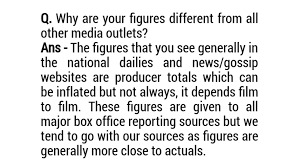
1 note
·
View note
Photo
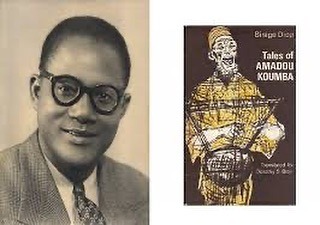
Birago Diop (December 11, 1906 – November 25, 1989) was a Senegalese poet and storyteller whose work restored general interest in African folktales and promoted him to one of the most outstanding African francophone writers. A renowned veterinarian, diplomat, and leading voice of the Négritude literary movement, he exemplified the "African renaissance man". He earned a scholarship to attend the French-speaking school Lycée Faidherbe in Saint-Louis, which was then Senegal's capital. He became fascinated with the poems and style of writing of Victor Hugo, Charles Baudelaire, Edgar Allan Poe, and several others and began writing his own. He served as a nurse in a military hospital and went on to study and graduate in veterinary medicine at the University of Toulouse. He was most recognized for his poems and folktales, he worked as a veterinary surgeon for the French colonial government in several West African countries, spending 1937–39 in French Sudan (now Mali), 1940 in the Ivory Coast, and French Upper Volta (now Burkina Faso), and 1950 in Mauritania. Throughout his civil service career in 1934, he collected and reworked Wolof folktales, and wrote poetry, memoirs, and a play. He served as the first Senegalese ambassador to Tunisia from 1960 to 1965. #africanhistory365 #africanexcellence https://www.instagram.com/p/CmB6QLkLdWJ/?igshid=NGJjMDIxMWI=
0 notes
Quote
You lived, but somewhere else, / your presence touched others, ring upon ring / and changed. Did you think / I would not change?
Denise Levertov, from “Everything that Acts is Actual”, Collected Earlier Poems, 1940-1960
140 notes
·
View notes
Text
175+ non-Western literature recommendations to diversify your academia, organized by continent + country
I love world literature, and I’ve been frustrated by the lack of representation of it in literature + academia communities on tumblr, so here are some recommendations. I haven’t read all of these myself yet, but the ones I have are excellent and the ones I haven’t come highly recommended from Goodreads and are on my to-read list!
With the exception of anthologies of older works, all of these books were written before 2000 (some literally thousands of years earlier), since I’m less familiar with super contemporary literature. Also, I only included each writer once, though many of them have multiple amazing books. I’m sure there are plenty of incredible books I’m missing, so please feel free to add on to this list! And countries that aren’t included absolutely have a lot to offer as well--usually, it was just hard to find books available in English translation (which all of the ones below are.)
List below the cut (it’s my first post with a cut so let’s hope I do it right... and also warning that it’s super long)
ASIA:
Bangladesh:
Pather Panchali by Bibhutibhushan Bandyopadhyay (1929)
China:
Tao Te Ching by Lao Tzu (6th century BCE)
The Art of War by Sun Tzu (5th century BCE)
The Analects by Confucius (circa 5th-4th century BCE?)
The Book of Chuang Tzu by Zhuangzi (4th century BCE)
Mencius by Mencius (3rd century BCE)
The Songs of the South: An Anthology of Ancient Chinese Poems by Qu Yuan and Other Poets (2nd century AD)
Li Po and Tu Fu: Poems by Li Po and Tu Fu (written 8th century AD)
Poems of Wang Wei (8th century AD)
Romance of the Three Kingdoms by Luo Guanzhong (14th century AD)
Strange Tales from a Chinese Studio by Pu Songling (1740)
Dream of the Red Chamber by Xueqin Cao (1791)
Six Records of a Floating Life by Shen Fu (1809)
Diary of a Madman and Other Stories by Lu Xun (1918)
Mr Ma and Son by Lao She (1929)
Family by Ba Jin (1933)
Love in a Fallen City by Eileen Chang (1943)
A Source Book in Chinese Philosophy by Wing-Tsit Chan (1963)
Red Sorghum by Mo Yan (1987)
Soul Mountain by Gao Xingjian (1989)
The Big Red Book of Modern Chinese Literature edited by Yunte Huang (anthology, 2016)
India:
The Rig Vega (1500-1200 BCE)
The Mahabharata and the Bhagavad Gita (around 400 BCE but not known exactly. The Gita is part of the Mahabharata)
The Upanishads (REALLY wide date range)
The Dhammapada (3rd century BCE)
The Fundamental Wisdom of the Middle Way by Nāgārjuna (2nd century AD)
The Recognition of Sakuntala by Kālidāsa (4th century AD)
The Way of the Bodhisattva by Santideva (700 AD)
Gitanjali by Rabindranath Tagore (1910)
Annihilation of Caste by B.R. Ambedkar (1936)
The Discovery of India by Jawaharlal Nehru (1946)
Train to Pakistan by Khushwant Singh (1956)
A Source Book in Indian Philosophy by Sarvepalli Radhakrishnan and Charles Alexander Moore (1957)
Midnight's Children by Salman Rushdie (1981)
A Suitable Boy by Vikram Seth (1993)
Women Writing in India: 600 BC to the Present V: The Twentieth Century by Susie J. Tharu and K. Lalita (1993)
A Fine Balance by Rohinton Mistry (1995)
The God of Small Things by Arundhati Roy (1996)
Interpreter of Maladies by Jhumpa Lahiri (1999)
Indian Philosophy in English: From Renaissance to Independence (anthology, 2011)
Indonesia:
The Weaverbirds by Y.B. Mangunwijaya (1981)
Iran:
Shahnameh: The Persian Book of Kings by Abolqasem Ferdowsi (11th century AD)
The Essential Rumi by Rumi (13th century AD)
The Blind Owl by Sadegh Hedayat (1936)
Savushun by Simin Daneshvar (1969)
My Uncle Napoleon by Iran Pezeshkzad (1973)
Missing Soluch by Mahmoud Dowlatabadi (1979)
Iraq:
Fifteen Iraqi Poets edited by Dunya Mikhail (published 2013 but the poems are 20th century)
Japan:
The Ink Dark Moon: Love Poems by Ono no Komachi and Izumi Shikibu (9th-10th century AD)
The Pillow Book by Sei Shōnagon (1002 AD)
The Tale of Genji by Murasaki Shikibu (1008 AD)
The Tale of the Heike, unknown (12th century AD)
One Hundred Poets, One Poem Each: A Treasury of Classical Japanese Verse (not sure of year)
Essays in Idleness by Yoshida Kenkō (1332)
Kokoro by Natsume Sōseki (1914)
No Longer Human by Osamu Dazai (1948)
Snow Country by Yasunari Kawabata (1948)
The Makioka Sisters by Jun'ichirō Tanizaki (1948)
Confessions of a Mask by Yukio Mishima (1949)
Masks by Fumiko Enchi (1958)
The Woman in the Dunes by Kōbō Abe (1962)
A Personal Matter by Kenzaburō Ōe (1964)
Silence by Shūsaku Endō (1966)
Korea (written before the division into North/South):
The Memoirs of Lady Hyegyong (written 1795-1805)
Lebanon:
Samarkand by Amin Maalouf (1988)
Gate of the Sun by Elias Khoury (1998)
Pakistan:
We Sinful Women: Contemporary Urdu Feminist Poetry (1991)
The Rebel's Silhouette: Selected Poems by Faiz Ahmed Faiz (1991)
The Taste of Words: An Introduction to Urdu Poetry edited by Raza Mir (2014)
Palestine:
Men in the Sun and Other Palestinian Stories by Ghassan Kanafani (1963)
Orientalism by Edward Said (1978)
I Saw Ramallah by Mourid Barghouti (1997)
Mural by Mahmoud Darwish (2000, which technically breaks my rule by a year but it’s great)
Philippines:
Noli Me Tángere by José Rizal (1887)
Saudi Arabia:
Cities of Salt by Abdul Rahman Munif (1984)
Sri Lanka:
Funny Boy by Shyam Selvadurai (1994)
Syria:
Damascus Nights by Rafik Schami (1989)
Taiwan:
Last Words from Montmartre by Qiu Miaojin (1996)
Turkey:
My Name Is Red by Orhan Pamuk (1998)
Vietnam:
Spring Essence: The Poetry of Hô Xuân Huong by Hô Xuân Huong (1801)
The Tale of Kieu by Nguyen Du (1820)
Paradise of the Blind by Duong Thu Huong (1988)
Miscellaneous Asia (country unclear or multiple current day countries):
The Epic of Gilgamesh (circa 1800 BCE)
Myths from Mesopotamia translated by Stephanie Dailey
The Arabian Nights (as early as the 9th century AD, lots of changes over the years)
The Qur’an
AFRICA:
Algeria:
Fantasia: An Algerian Cavalcade by Assia Djebar (1985)
The Bridges of Constantine by Ahlam Mosteghanemi (1993)
Cameroon:
Houseboy by Ferdinand Oyono (1956)
Egypt:
The Tale of Sinuhe and Other Ancient Egyptian Poems 1940 - 1640 B.C. translated by R.B. Parkinson
Palace Walk by Naguib Mahfouz (1956)
The Sinners by Yusuf Idris (1959)
Woman at Point Zero by Nawal El Saadawi (1975)
The Map of Love by Ahdaf Soueif (1999)
Ghana:
Our Sister Killjoy by Ama Ata Aidoo (1977)
Two Thousand Seasons by Ayi Kwei Armah (1979)
In My Father’s House: Africa in the Philosophy of Culture by Kwame Anthony Appiah (1992)
Guinea:
The Radiance of the King by Camara Laye (1954)
Kenya:
A Grain of Wheat by Ngugi wa Thing'o (1994)
The River and the Source by Margaret A. Ogola (1995)
Libya:
The Bleeding of the Stone by Ibrahim al-Koni (1990)
Mali:
The Fortunes of Wangrin by Amadou Hampâté Bâ (1973)
Nigeria:
The Palm-Wine Drinkard by Amos Tutuola (1952)
Things Fall Apart by Chinua Achebe (1958)
Efuru by Flora Nwapa (1966)
The Joys of Motherhood by Buchi Emecheta (1979)
Aké: The Years of Childhood by Wole Soyinka (1981)
Sozaboy: A Novel in Rotten English by Ken Saro-Wiwa (1985)
The Famished Road by Ben Okri (1991)
Senegal:
God’s Bits of Wood by Ousmane Sembène (1960)
So Long a Letter by Mariama Bâ (1981)
Somalia:
Maps by Nuruddin Farah (1986)
South Africa:
When Rain Clouds Gather by Bessie Head (1969)
Fools and Other Stories by Njabulo S. Ndebele (1986)
Sudan:
Season of Migration to the North by Tayeb Salih (1966)
Tunisia:
The Colonizer and the Colonized by Albert Memmi (1957)
Zimbabwe:
The House of Hunger by Dambudzo Marechera (1978)
Nervous Conditions by Tsitsi Dangarembga (1988)
Miscellaneous Africa:
The Granta Book of the African Short Story edited by Helon Habila (2011)
The Penguin Book of Modern African Poetry edited by Gerald Moore and Ulli Beier (1963)
AMERICAS:
Antigua and Barbuda:
A Small Place by Jamaica Kincaid (1988)
Argentina:
Ficciones by Jorge Luis Borges (1944)
Hopscotch by Julio Cortázar (1963)
The Museum of Eterna’s Novel (The First Good Novel) by Macedonio Fernández (1967)
Kiss of the Spider Woman by Manuel Puig (1976)
The Sixty-Five Years of Washington by Juan José Saer (1985)
How I Became a Nun by César Aira (1993)
Thus Were Their Faces by Silvina Ocampo (2015 but written earlier)
Brazil:
Dom Casmurro by Machado de Assis (1900)
Chronicle of the Murdered House by Lúcio Cardoso (1959)
Dona Flor and her Two Husbands by Jorge Amado (1966)
Pedagagy of the Oppressed by Paulo Freire (1968)
The Hour of the Star by Clarice Lispector (1977)
Vast Emotions and Imperfect Thoughts by Rubem Fonseca (1988)
Chile:
The Obscene Bird of Night by José Donoso (1970)
Emergency Poems by Nicanor Parra (1972)
The House of the Spirits by Isabel Allende (1982)
Colombia:
One Hundred Years of Solitude by Gabriel García Márquez (1967)
Cuba:
The Kingdom of This World by Alejo Carpentier (1949)
Cold Tales by Virgilio Piñera (1958)
Dominican Republic:
In the Time of the Butterflies by Julia Alvarez (1994)
Guatemala:
Men of Maize by Miguel Ángel Asturias (1949)
I, Rigoberta Menchú by Rigoberta Menchú (1985)
Guadalupe (part of France but overseas):
I, Tituba, Black Witch of Salem by Maryse Condé (1986)
Haiti:
Breath, Eyes, Memory by Edwige Danticat (1994)
Jamaica:
No Telephone to Heaven by Michelle Cliff (1987)
The True History of Paradise by Margaret Cezair-Thompson (1999)
Martinique (part of France but overseas):
Discourse on Colonialism by Aimé Césaire (1950)
Wretched of the Earth by Frantz Fanon (1961)
Poetics of Relation by Édouard Glissant (1997)
Mexico:
Pedro Páramo by Juan Rulfo (1955)
Aura by Carlos Fuentes (1962)
The Hole by José Revueltas (1969)
Underground River and Other Stories by Inés Arredondo (1979)
The Collected Poems, 1957-1987 by Octavio Paz (1987)
Like Water for Chocolate by Laura Esquivel (1989)
Nicaragua:
Azul by Rubén Darío (1888)
Peru:
The Cardboard House by Martín Adán (1928)
The Time of the Hero by Mario Vargas Llosa (1962)
The Complete Poems by César Vallejo (1968)
St. Lucia:
Omeros by Derek Walcott (1990)
Trinidad and Tobago:
The Black Jacobins: Toussaint L'Ouverture and the San Domingo Revolution by C.L.R. James (1938)
A House for Mr. Biswas by V.S. Naipaul (1961)
Uruguay:
Open Veins of Latin America by Eduardo Galeano (1971)
Venezuela:
Doña Bárbara by Rómulo Gallegos (1929)
Indigenous Writers from Canada and the United States:
American Indian Stories by Zitkála-Šá (Dakota) (1921)
Winter in the Blood by James Welch (Blackfeet and A’aninin) (1974)
Emplumada by Lorna Dee Cervantes (Chumash) (1982)
She Had Some Horses by Joy Harjo (Mvskoke) (1982)
Love Medicine by Louise Erdrich (Chippewa) (1984)
Ceremony by Leslie Marmon Silko (Laguna Pueblo) (1986)
Custer Died for Your Sins by Vine Deloria Jr. (Dakota) (1988)
The Grass Dancer by Susan Power (Dakota) (1997)
Miscellaneous Americas:
And We Sold the Rain: Contemporary Fiction from Central America edited by Rosario Santos (1988)
Short Stories by Latin American Women: The Magic and the Real edited by Celia Correas de Zapata (2003)
Bordering Fires: The Vintage Book of Contemporary Mexican and Chicana and Chicano Literature edited by Cristina García (2006)
#dark academia#light academia#academia aesthetic#academic#academia#academics#studyblr#litblr#reading#books#booklr#literature#world literature#poc literature#writers of color#bookworm#bookaddict
3K notes
·
View notes
Photo

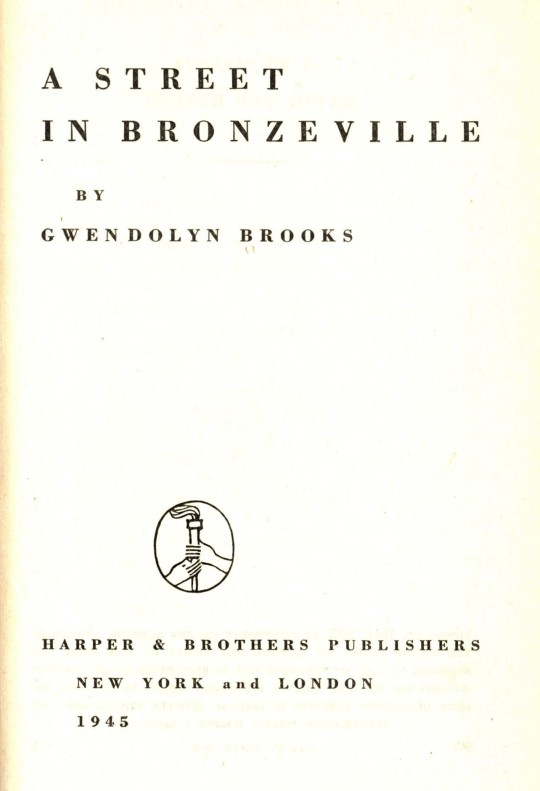

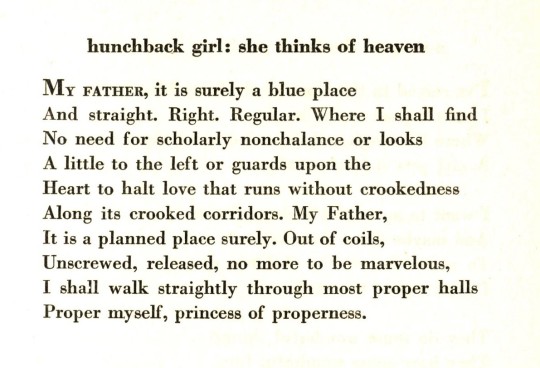
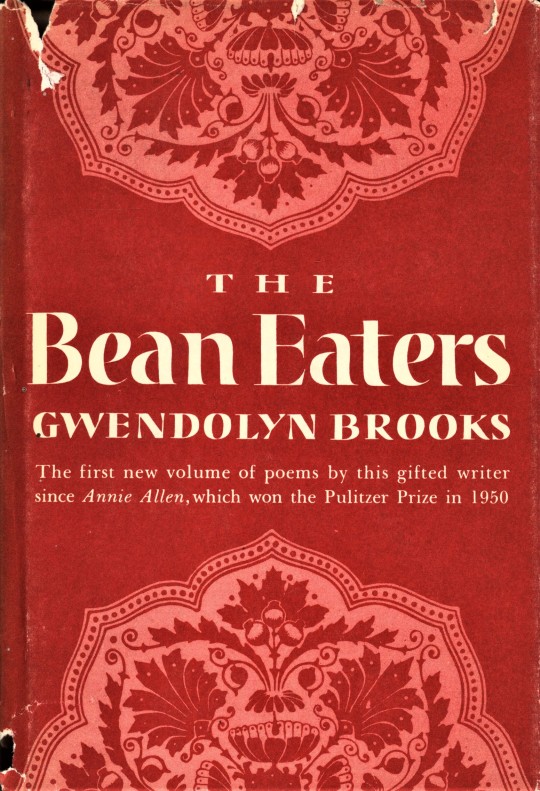

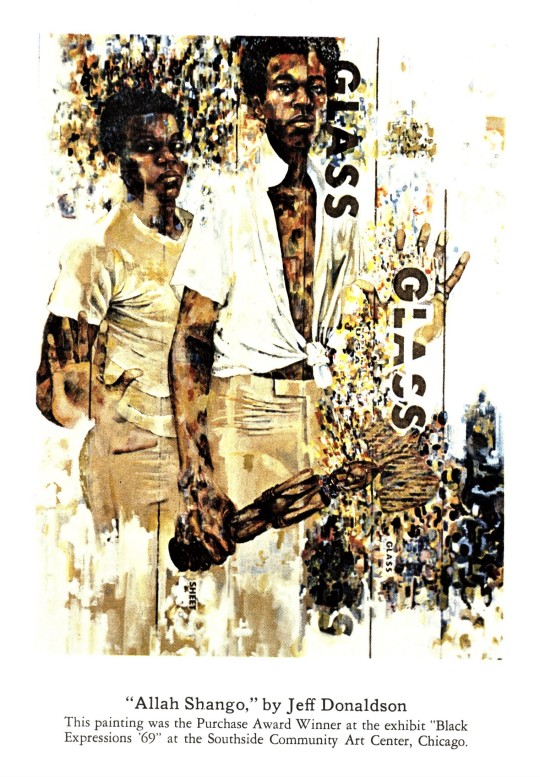

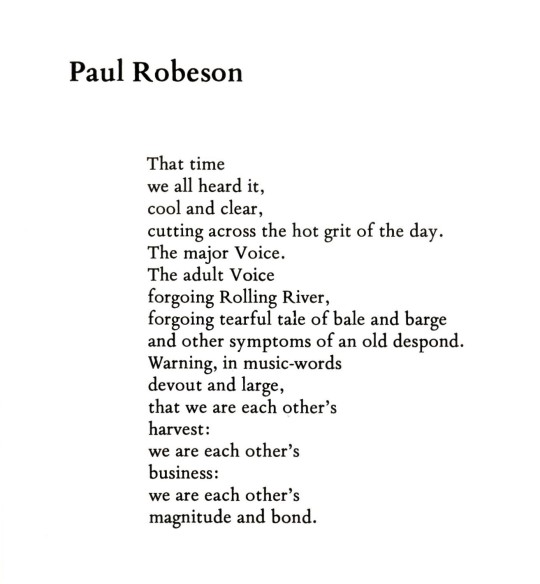

Magnificent Women Monday
During Black History Month, we featured Bronzeville Boys and Girls written by legendary American poet Gwendolyn Brooks. One post was simply not enough to convey the range of Brooks’s work, so we’ve chosen to dedicate this #Magnificent Women Monday to her.
Born in Chicago in 1917, Brooks rose to fame through the portrayals of ordinary life in her community and had published 75 poems in literary magazines by the age of 16. Among her long list of honors is her position as the first African American recipient of the Pulitzer Prize in 1950 for Annie Allen, and serving as Poet Laurate Consultant in Poetry for the Library of Congress from 1985 to 1986 and Poet Laurate of Illinois from 1968 until her death in 2000. Her poetry reflects an authentic, textured viewpoint of African American life. Toni Morrison crediting her with creating space for young Black writers and artists to exist in freely.
Her activism in promoting African American literature led her to leave her influential publisher Harper and Row in 1970 for Dudley Randall’s Broadside Press, and she would continue to work mainly with African American publishers for the rest of her life. Part of the widespread interest in her work lies in her ability to bridge the gap between the academic poetry stylings of the 1940s and Black militant writings of the 1960s as described by George E. Kent in A Life of Gwendolyn Brooks, allowing a political consciousness to inform her writing without allowing it to become the lone message of her work. We hold 11 titles by Gwendolyn Brooks. Shown here in order are:
1.) Portrait of Gwendolyn Brooks by Roy Lewis from Riot, Broadside Press. 1970.
2-4.) Title page and poems from the first edition of A Street in Bronzeville, Brooks's first published collection, Harper & Brothers, 1945.
5.) Dust jacket designed by Shirley Smith from the first edition of The Bean Eaters, a collection of poems that follows the slow rhythm of an elderly couple’s daily life, published by Harper & Brothers in 1960.
6 & 7.) Cover and frontispiece from a painting by Jeff Donaldson from the second printing of Riot, Broadside Press, Detroit, 1970.
8 & 9.) Title page and poem from the first printing of Family Pictures, Broadside Press, 1971.
10.) Cover from the first printing of Aloneness, a children's picture book illustrated by Leroy Foster, Broadside Press, 1971.
View more Magnificent Women Monday posts.
--Emily, Special Collections Writing Intern
#Magnificent Women Monday#Gwendolyn Brooks#poetry#women poets#African American poets#African American women#Dudley Randall#Broadside Press#Roy Lewis#A Street in Bronzeville#The Bean Eaters#Shirley Smith#Jeff Donaldson#Riot#Family Pictures#Aloneness#Leroy Foster#Emily Birz
70 notes
·
View notes
Photo
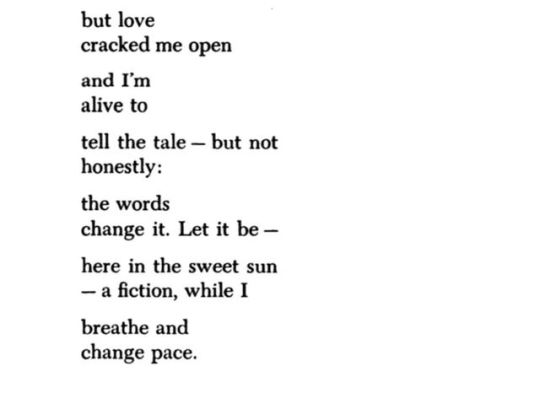
Denise Levertov, from “The Third Dimension” featured in Collected Earlier Poems:1940-1960
3K notes
·
View notes
Photo
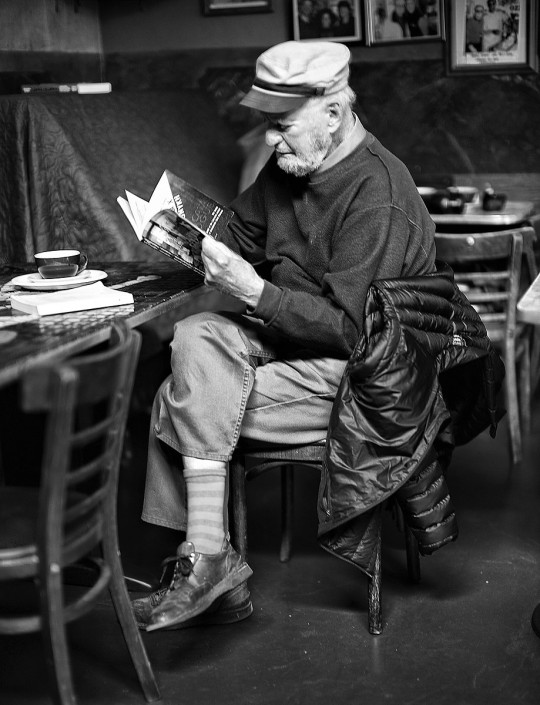
Lawrence Ferlinghetti, poet, artist, activist and founder of San Francisco’s famous City Lights Bookstore, who has died aged 101 of interstitial lung disease, was the least “beat” of the Beat Generation. In addition to a political commitment that blended anarchism and ecology – he loathed the motor car, calling it “the infernal combustion engine” – he had an instinctive business sense, founded on the philosophy of small is beautiful. City Lights, which he started in partnership with the magazine editor Peter Martin in the early 1950s, is still among the most welcoming of shops, with its tables and chairs, sheaves of magazines, and signs saying: “Pick a book, sit down, and read.”
Ferlinghetti discouraged interviewers and seekers of personal information. “If I had some biographical questionnaire to answer, I would always make something up,” he once said. Different reference books give different dates of birth, and one published story had it that he wrote his doctoral dissertation on the place of the pissoir in French literature. For many years, he listed his dog, Homer, as City Lights’ publicity and public relations officer. The poet recalled that Homer Ferlinghetti received regular mail, but that his public relations career stalled when he peed against a policeman’s leg. For this act of citizenship, he was immortalised by his master in the poem Dog.
Perhaps the facts made Ferlinghetti uncomfortable. He was born Lawrence Monsanto Ferling in Yonkers, New York, to a French mother, Albertine Mendes-Monsanto, and an Italian father, Carlo Ferlinghetti, an auctioneer, who had shortened the family name to Ferling. His parents were unable to care for him, however (sometimes Ferlinghetti said his father had died before his birth, sometimes after), and he was rescued by an aunt, Emily Monsanto. She took him to France, where they lived for his first six years. Returning to the US, Emily was employed as a governess by a family called Lawrence, a branch of the one that founded Sarah Lawrence College. “Then she left me there,” Ferlinghetti told an interviewer in 1978. “She just disappeared one day, and that family brought me up.”
His education was extensive. In the early 1940s, he attended the University of North Carolina, where a professor introduced him to the vernacular voice in poetry. This was a revelation: you didn’t have to sound like TS Eliot to write a poem. After wartime naval service had taken him back to Europe, Ferlinghetti enrolled at the Sorbonne, studying French literature while translating poets and novelists in his spare time. One day in a restaurant, he noticed that the paper tablecloth had a poem written on it, and that it was signed “Jacques Prévert”. He took the tablecloth with him as he left the restaurant, and some years later translated the poems in Prévert’s Paroles, eventually published, under the original title, by his own City Lights Books.
Back in New York again in 1946, Ferlinghetti went to Columbia University, preparing a thesis on Ruskin and Turner. He just missed meeting Allen Ginsberg and Jack Kerouac, who by then had either been banned from (Ginsberg) or had dropped out of (Kerouac) the university. Ferlinghetti did not team up with the Beats until eight years later, in San Francisco.
Drawn to Paris once more at the end of the 1940s, he met George Whitman, proprietor of the English-language bookshop opposite Notre Dame, which was first known as Le Mistral and is now Shakespeare and Company. Ferlinghetti looked to Whitman as an example when he opened City Lights Bookstore in 1953. It was the first all-paperback bookshop in the US, and, as Ferlinghetti said, “Once we opened, we just couldn’t get the doors closed.” He ran the place more in the spirit of public service than for profit, and by the 70s was content to live on his book royalties and plough the takings at the counter back into the shop.
Two years after starting City Lights, Ferlinghetti published his own collection of poems, Pictures of the Gone World, as No 1 in the Pocket Poets series, little four by five-inch, black-and-white paperbacks, which continue to appear today – one of the most popular literary lists of modern times. It was at this stage that he reverted to the original family name, Ferlinghetti. The next two Pocket Poets after Ferlinghetti were Kenneth Rexroth and Kenneth Patchen – as a result, both were drafted as “fathers of the Beat Generation”, somewhat to their displeasure – but it was the fourth in the series that ensured the list’s success. And for that, as Ferlinghetti was quick to point out, they had to thank the San Francisco police department.
The book was Howl and Other Poems, by Allen Ginsberg. Ferlinghetti had heard Ginsberg read the title poem at an event at the Six Gallery, San Francisco, in October 1955. On returning home, he sent the poet a message that consciously echoed the famous letter from Ralph Waldo Emerson to Walt Whitman after Emerson had read Whitman’s Leaves of Grass: “I greet you at the beginning of a great career.” The proprietor of City Lights added: “When do I get the manuscript?”
The book was published the following year, in an edition of 1,000 copies. However, after a failed attempt by the police to prosecute the bookseller for peddling obscene material, the reprints could not come fast enough. Ferlinghetti joked that the police “took over the advertising account and did a much better job”. Howl remains the bedrock of City Lights’ success as a publishing concern. It has now gone through well over 50 reprints, often more than one a year.
Ferlinghetti’s own poetry is irreverent, cajoling, casual and loose-limbed, sometimes excessively so. His models were Whitman and William Carlos Williams. In partnership with Rexroth, he took part in many poetry and jazz events on the West Coast, and the two made a record together. Ferlinghetti later became disillusioned with the poetry and jazz combination – “The poet ended up sounding like he was hawking fish from a street corner,” he said.
His verse on the page, though, suggests a spoken origin, as in his poem Underwear:
Underwear controls everything in the end
Take foundation garments for instance
They are really fascist forms of underground government ….
In addition to his many collections of verse, including A Coney Island of the Mind (1958), The Secret Meaning of Things (1969) and Endless Life (1981), Ferlinghetti wrote two novels: Love in the Days of Rage (1988), which is set during the student revolt of 1968 in Paris, and Her (1960), a more experimental work, a classic “poet’s novel”.
On one of his transatlantic voyages, Ferlinghetti met Selden Kirby-Smith (known as Kirby), whom he had had a passing acquaintance with at Columbia. They married in 1951 and had two children, Julie and Lorenzo, but were divorced in 1976.
In 1971, Nancy Peters, a former librarian at the Library of Congress, joined the company, and as time went on played a larger part in running the business, leaving Ferlinghetti to his creative work. She served as executive director from 1984 until 2007, and then continued to be involved as a co-owner of the business.
Ferlinghetti also had a serious interest in painting, and in 1990 the University of California mounted a retrospective. Many poems feature the names of painters, or employ a self-consciously “painterly” style, such as Short Story in a Painting of Gustav Klimt or Returning to Paris with Pissarro.
Ferlinghetti disliked being associated with the Beats, though he benefited from it, and, despite his love of Ginsberg, was apt to lament the commercialisation of the Beat Generation. Ginsberg, he said, “fabricated the whole thing out of his imagination”. But, happily contradicting himself, he could add, as late as 1996, “It’s still the only rebellion around.”
A collection of the correspondence between Ferlinghetti and Ginsberg was published in 2015, under the title I Greet You at the Beginning of a Great Career. At the same time, a selection of his travel journals appeared, Writing Across Landscapes.
Ferlinghetti expressed disappointment in other Beat writers for their unstructured approach to politics. He decided to travel to Cuba to see the Castro regime for himself and later wrote One Thousand Words for Fidel Castro, which ends, “Fidel … I give you my sprig of laurel.” Another political poem evoked a surrealistic scene by Goya, showing “freeways 50 lanes wide”, with “fewer tumbrils / but more maimed citizens / in painted cars”. In 2012 he declined to accept an award from the Hungarian Pen club, in protest at the policies of prime minister Viktor Orbán.
City Lights, open till midnight seven days a week, was Ferlinghetti’s way of infusing the spirit of resistance peacefully into the streets of San Francisco.
With Peters, he wrote a Literary Guide to San Francisco (1980), and in 1988 was responsible for the renaming of 10 streets after writers associated with the city, including Jack Kerouac Alley, partly composed of City Lights’ back wall. In 1994, he himself was similarly honoured by Via Ferlinghetti, the first time a street has been named after a living writer in the history of the city.
He is survived by his children and three grandchildren.
• Lawrence Monsanto Ferlinghetti, poet, artist and bookseller, born 24 March 1919; died 22 February 2021
Daily inspiration. Discover more photos at http://justforbooks.tumblr.com
20 notes
·
View notes
Text
2021 Reading and Watching Resolutions
2020 is dead! It’s a new year, and with it come a new set of reading and watching resolutions. A few small tweaks, but these are mostly the same lists as last time. If you see any categories that you have recommendations for, feel free to drop me a line.
2021 Reading Resolution
A book written in North America: Son of a Trickster by Eden Robinson
A book written in Central America/Caribbean: Annie John by Jamaica Kincaid
A book written in South America: Full Woman, Fleshly Apple, Hot Moon: Selected Poems of Pablo Neruda by Pablo Neruda, translated by Stephen Mitchell
A book written in East Asia: I Am a Hero: Omnibus Volume 1 by Kengo Hanazawa
A book written in South Asia: A Burning by Megha Majumdar
A book written in Africa: Freshwater by Akwaeke Emezi
A book written in the Middle East: Death is Hard Work by Khaled Khalifa
A book written in Australia/Pacific Islands: Gideon the Ninth by Tamsyn Muir
A book written in Russia: The Blizzard by Vladimir Sorokin
A book written in Europe: White Is for Witching by Helen Oyeyemi
A biography: Shirley Jackson: A Rather Haunted Life by Ruth Franklin
A non-fiction book: Forgiveness: A Gift from My Grandparents by Mark Sakamoto
A collection of short stories: A Short History of Indians in Canada by Thomas King
A collection of poetry: Night Sky with Exit Wounds by Ocean Vuong
A play: The Importance of Being Earnest by Oscar Wilde
A book you’ve seen adapted: Tipping the Velvet by Sarah Waters
A graphic novel: Die Vol 2: Split the Party by Kieron Gillen, illustrated by Stephanie Hans
A children’s book: Valley of the Moon: The Diary of María Rosalía de Milagros by Sherry Garland
A book older than 100 years: The King in Yellow by Robert W. Chambers
A debut novel: I Am Not a Serial Killer by Dan Wells
A novel by a famous author, other than the one(s) they are best known for: Pericles by William Shakespeare
A sequel: The Sugared Game (The Will Darling Adventures #2) by KJ Charles
A book by an author you’ve never given a fair shot: Along Came A Spider by James Patterson
A book you’ve heard bad things about: The Host by Stephenie Meyer
A book released in 2021: Subtle Blood (The Will Darling Adventures #3) by KJ Charles
Wild Card: Slippery Creatures (The Will Darling Adventures #1) by KJ Charles
Wild Card: Universal Harvester by John Darnielle
Wild Card: Dream Daddy: A Dad Dating Comic Book by Leighton Gray and Vernon Shaw
Wild Card: Ring by Koji Suzuki
Wild Card: The Degenerates by J. Albert Mann
Bonus Reading:
A Disability History of the United States by Kim E. Nielsen
The Subsidiary by Matías Celedón
I’ll Never Get Out of This World Alive by Steve Earle
Venomous: How Earth's Deadliest Creatures Mastered Biochemistry by Christie Wilcox
Binti by Nnedi Okorafor
The Burning Girls by C.J. Tudor
List Progress: 36/30
2021 Film Watching Resolution
A foreign film: Beware of Children (Barn) (2019)
A black and white film: M (1931)
A silent or dialogue-free film: Modern Times (1936)
An animated film: Fantastic Planet (1973)
A film based on a true story: Radium Girls (2018)
A documentary: Heroin(e) (2017)
A film based on a book: In the Tall Grass (2019)
An Oscar-winning movie: Rebecca (1940)
A trashy movie: Equilibrium (2002)
Your best friend’s recommendation: Arsenic and Old Lace (1944)
A children’s film: The Secret World of Arrietty (2010)
A film released in 2021: The Woman in the Window (2021)
List Progress: 12/12
Movies Outside the List:
Booksmart (2019)
All-In Madonna (2020)
Shiva Baby (2020)
Vera Drake (2004)
Ma (2019)
The Exorcist (1973)
The Omen (1976)
The Ring (2002)
Downton Abbey (2019)
The Clovehitch Killer (2018)
The Dance of the 41 (El baile de los 41) (2020)
Saint Maud (2019)
Unfriended (2014)
Psycho (1960)
Tampopo (1985)
Dear Evan Hansen (2021)
tick, tick...BOOM! (2021)
The Greatest Showman (2017)
The Night of the Hunter (1955)
I Think We’re Alone Now (2018)
Pride (2014)
10 Cloverfield Lane (2016)
5 notes
·
View notes
Photo


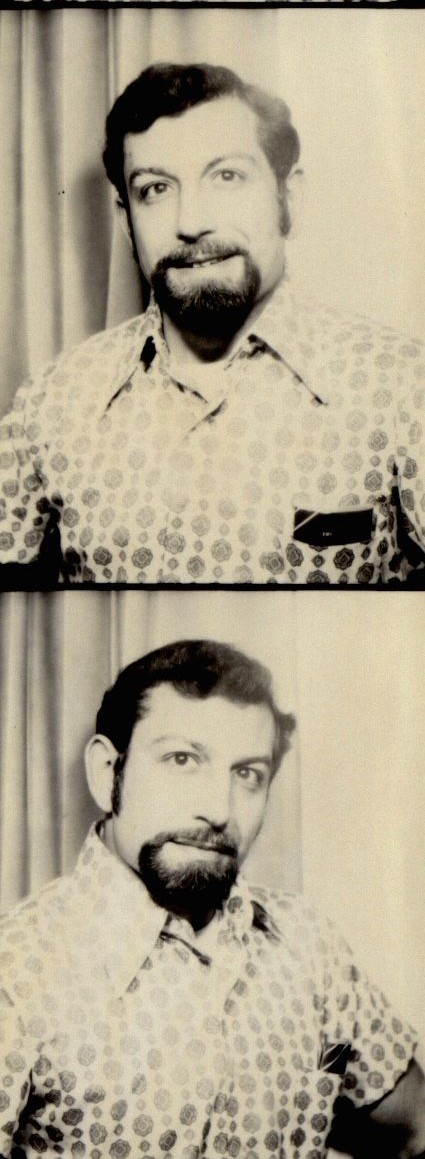

Maurice Sarfaty: National Novel Writing Month
This #NaNoWriMo we are spotlighting Maurice Sarfaty, self-published author and prolific writer of fantasy, horror, and gothic stories. Featured here are the first page of his final manuscript of “Tania,” as well as a cover sketch for a collection of his short stories. Sarfaty’s writng wasn’t limited to fiction, as he also wrote more than two-hundred opinion pieces that were published in the Milwaukee Journal, Milwaukee Sentinel, and Chicago Tribune.
All of the photos and manuscript drafts featured here and more can be found in the Maurice Sarfaty Papers, UWM Mss 198, Boxes 1 and 8 at the UWM Archives. Through his journals and manuscripts one can get an idea of his inspiration and process.
Maurice Sarfaty was born in Greece in 1940. His family immigrated to the United States in 1951 and eventually settled in Milwaukee’s north side. Maurice graduated from Washington High School in 1960 and wrote his first stories and poems in 1964.
-Lizzie, Archives Graduate Intern
#NaNoWriMo#UWM Archives#Maurice Sarfaty#Milwaukee#local author#Lizzie#National Novel Writing Month#Horror#Fiction Writer#Fantasy#writers#archives
55 notes
·
View notes
Text
Kirk Douglas as Actor and Producer by Susan King

Though 102-year-old Kirk Douglas earned Best Actor nominations for 1949’s CHAMPION, 1952’s THE BAD AND THE BEAUTIFUL and 1956’s LUST FOR LIFE, it is his performance as the brave slave who leads a revolt against the Roman Empire in 1960’s SPARTACUS that has become his career-defining role. And little wonder.
Not only is he chiseled to the max, Michael Douglas’ dad is brave, fierce and intensely romantic in the classic epic that won four Academy Awards, including supporting actor for Peter Ustinov and for Russell Metty’s cinematography. Serving as also executive producer, SPARTACUS marked Kirk Douglas’ second collaboration with director Stanley Kubrick. The two had previously worked together on the gut-wrenching 1957 anti-war film PATHS OF GLORY.
Douglas, whom I have interviewed eight times between 1986-2017, told me in a 2011 L.A. Times chat that Universal had originally hired Anthony Mann to direct the epic. The acclaimed Mann had cut his directing teeth in low-budget but atmospheric films noir in the 1940s and worked with Jimmy Stewart in the 1950s in a series of gritty Westerns, including 1953’s THE NAKED SPUR.
“I never wanted Anthony Mann,” he said. “The studio wanted him because he had made so many successful pictures.”
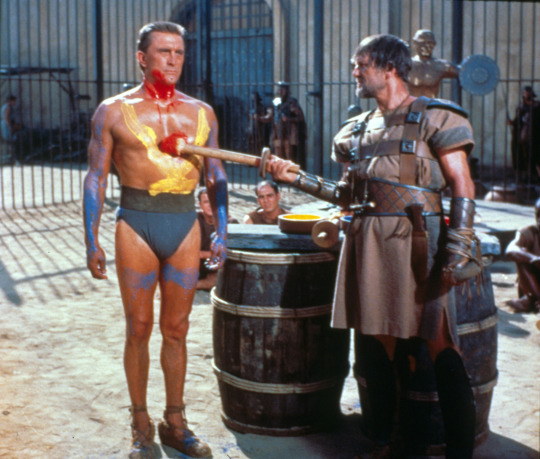
Douglas noted that Mann was “intimidated” by the all-star cast including Ustinov, Laurence Olivier, Jean Simmons and Tony Curtis. “Ustinov captivated him,” he explained. “He saw Ustinov as a genius, so he let him do whatever he wanted. After three weeks, the studio said ‘Kirk, you were right. You have to fire him.’’’ Mann, said Douglas, wasn’t upset at the firing. In fact, the two worked together on 1965’s THE HEROES OF TELEMARK.
Enter Kubrick, who had just been fired by Marlon Brando from the Western ONE-EYED JACKS (’61). Brando took over the directing reigns on that film.
“I sent the [SPARTACUS] script to Stanley over the weekend, and on Monday he was at the studio ready to direct,’’ said Douglas. “I remember when I introduced him to the cast, he looked like he was 14, like a little kid. I said, ‘This is your new director.’ They thought I was joking. Kubrick wasn’t intimidated. He did a great job.”
Blacklisted screenwriter Dalton Trumbo wrote the screenplay for SPARTACUS, as well as the script for producer/director Otto Preminger’s historical 1960 epic EXODUS thus helping to break the blacklist that still gripped Hollywood. Both Douglas and Preminger had insisted the scribe receive screen credit.
“The studios were intimidated; they embraced the blacklist,” explained Douglas. “When I was thinking of breaking the blacklist, people were saying ‘Kirk, jeez, you will never work again.’ But I think I was at the right age. If I would have been older, I might have been too conservative. So, I just said, ‘The hell with it.’ I left messages at the gate of the studio that Dalton Trumbo will come on the set.”
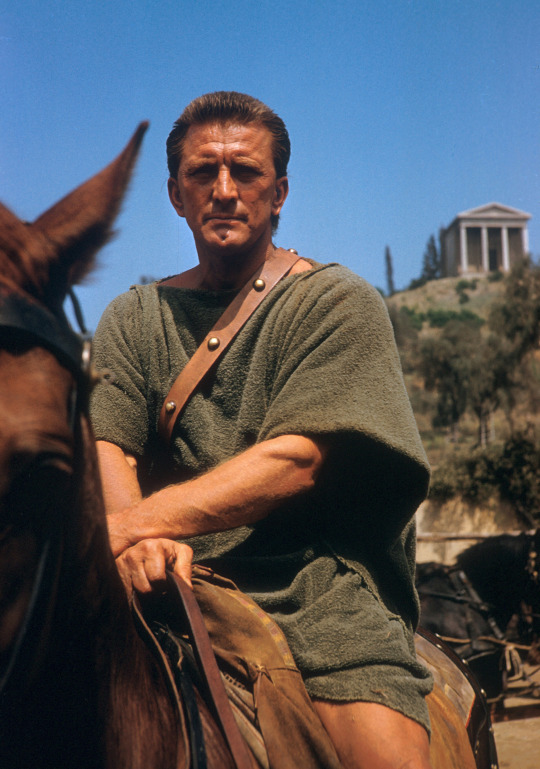
Douglas frequently went to Trumbo’s house to work on the script in the evenings. “He would be in the bathtub. He had a tray in his bathtub. He wrote most of the time there. He wanted a parrot. I bought him a parrot and sometimes the parrot would be on his shoulder.”
The Summer Under the Stars tribute to Douglas kicks off with his first feature, 1946’s film noir THE STRANGE LOVE OF MARTHA IVERS, directed by Lewis Milestone and also starring Barbara Stanwyck and Van Heflin. Also airing are Vincente Minnelli’s THE BAD AND THE BEAUTIFUL (‘52) and LUST FOR LIFE (‘56), Joseph Mankiewicz’s underrated 1970 Western THERE WAS A CROOKED MAN and two of my favorite Douglas flicks: 1950’s YOUNG MAN WITH A HORN and 1957’s GUNFIGHT AT THE O.K. CORRAL, one of the several films he made with his friend Burt Lancaster.
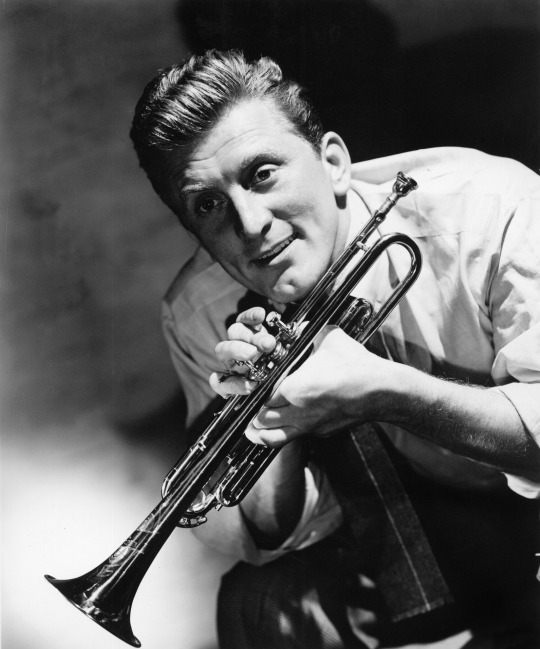
I found Douglas a changed man after suffering a major stroke in 1996—shortly before receiving an honorary Oscar—that left him with a pronounced speech impediment. He was very much the movie star and quite imposing when I first talked to him in 1986. But the four times I’ve talked to him since the stroke, Douglas couldn’t have been more funny or sweet.
“When I had my stroke, I saw things in a different way,” said Douglas in a 2009 interview at the Beverly Hills house he shares with his wife of 65 years, Anne.
“Everybody has to sometime in life take inventory. I think the final thing I had to discover about my life is you have to pay back. I came from abject poverty. I didn’t dream of being a millionaire. So, you have to pay back. Fortunately, my wife shares that view.”
They sold a lot of their art collection to fund everything from the Kirk Douglas High School in Northridge, CA, the Kirk Douglas Theatre in Culver City, CA and over 400 playgrounds.
Because of his macho image, Douglas said he “hid’ his poetic side. But in 2014, he published a book of his poems, Life Could Be Verse. “When you get to be 98, you begin to brave,” he explained to me. “You get strong enough to be weak.”
#Kirk Douglas#Summer Under the Stars#Stanley Kubrick#Dalton Trumbo#TCM#Turner Classic Movies#Susan King
133 notes
·
View notes
Text
Charles Mingus
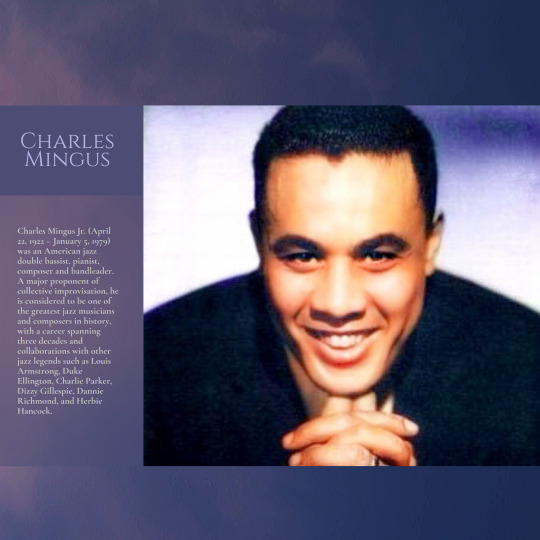
Charles Mingus Jr. (April 22, 1922 – January 5, 1979) was an American jazz double bassist, pianist, composer and bandleader. A major proponent of collective improvisation, he is considered to be one of the greatest jazz musicians and composers in history, with a career spanning three decades and collaborations with other jazz legends such as Louis Armstrong, Duke Ellington, Charlie Parker, Dizzy Gillespie, Dannie Richmond, and Herbie Hancock.
Mingus' compositions continue to be played by contemporary musicians ranging from the repertory bands Mingus Big Band, Mingus Dynasty, and Mingus Orchestra, to the high school students who play the charts and compete in the Charles Mingus High School Competition. In 1993, the Library of Congress acquired Mingus's collected papers—including scores, sound recordings, correspondence and photos—in what they described as "the most important acquisition of a manuscript collection relating to jazz in the Library's history".
Biography
Early life and career
Charles Mingus was born in Nogales, Arizona. His father, Charles Mingus Sr., was a sergeant in the U.S. Army. Mingus was largely raised in the Watts area of Los Angeles. His maternal grandfather was a Chinese British subject from Hong Kong, and his maternal grandmother was an African-American from the southern United States. Mingus was the third great-grandson of the family's founding patriarch who was, by most accounts, a German immigrant. His ancestors included German American, African American, and Native American.
In Mingus's autobiography Beneath the Underdog his mother was described as "the daughter of an English/Chinese man and a South-American woman", and his father was the son "of a black farm worker and a Swedish woman". Charles Mingus Sr. claims to have been raised by his mother and her husband as a white person until he was fourteen, when his mother revealed to her family that the child's true father was a black slave, after which he had to run away from his family and live on his own. The autobiography doesn't confirm whether Charles Mingus Sr. or Mingus himself believed this story was true, or whether it was merely an embellished version of the Mingus family's lineage.
His mother allowed only church-related music in their home, but Mingus developed an early love for other music, especially Duke Ellington. He studied trombone, and later cello, although he was unable to follow the cello professionally because, at the time, it was nearly impossible for a black musician to make a career of classical music, and the cello was not yet accepted as a jazz instrument. Despite this, Mingus was still attached to the cello; as he studied bass with Red Callender in the late 1930s, Callender even commented that the cello was still Mingus's main instrument. In Beneath the Underdog, Mingus states that he did not actually start learning bass until Buddy Collette accepted him into his swing band under the stipulation that he be the band's bass player.
Due to a poor education, the young Mingus could not read musical notation quickly enough to join the local youth orchestra. This had a serious impact on his early musical experiences, leaving him feeling ostracized from the classical music world. These early experiences, in addition to his lifelong confrontations with racism, were reflected in his music, which often focused on themes of racism, discrimination and (in)justice.
Much of the cello technique he learned was applicable to double bass when he took up the instrument in high school. He studied for five years with Herman Reinshagen, principal bassist of the New York Philharmonic, and compositional techniques with Lloyd Reese. Throughout much of his career, he played a bass made in 1927 by the German maker Ernst Heinrich Roth.
Beginning in his teen years, Mingus was writing quite advanced pieces; many are similar to Third Stream because they incorporate elements of classical music. A number of them were recorded in 1960 with conductor Gunther Schuller, and released as Pre-Bird, referring to Charlie "Bird" Parker; Mingus was one of many musicians whose perspectives on music were altered by Parker into "pre- and post-Bird" eras.
Mingus gained a reputation as a bass prodigy. His first major professional job was playing with former Ellington clarinetist Barney Bigard. He toured with Louis Armstrong in 1943, and by early 1945 was recording in Los Angeles in a band led by Russell Jacquet, which also included Teddy Edwards, Maurice Simon, Bill Davis, and Chico Hamilton, and in May that year, in Hollywood, again with Teddy Edwards, in a band led by Howard McGhee.
He then played with Lionel Hampton's band in the late 1940s; Hampton performed and recorded several of Mingus's pieces. A popular trio of Mingus, Red Norvo and Tal Farlow in 1950 and 1951 received considerable acclaim, but Mingus's race caused problems with club owners and he left the group. Mingus was briefly a member of Ellington's band in 1953, as a substitute for bassist Wendell Marshall. Mingus's notorious temper led to his being one of the few musicians personally fired by Ellington (Bubber Miley and drummer Bobby Durham are among the others), after a back-stage fight between Mingus and Juan Tizol.
Also in the early 1950s, before attaining commercial recognition as a bandleader, Mingus played gigs with Charlie Parker, whose compositions and improvisations greatly inspired and influenced him. Mingus considered Parker the greatest genius and innovator in jazz history, but he had a love-hate relationship with Parker's legacy. Mingus blamed the Parker mythology for a derivative crop of pretenders to Parker's throne. He was also conflicted and sometimes disgusted by Parker's self-destructive habits and the romanticized lure of drug addiction they offered to other jazz musicians. In response to the many sax players who imitated Parker, Mingus titled a song, "If Charlie Parker were a Gunslinger, There'd be a Whole Lot of Dead Copycats" (released on Mingus Dynasty as "Gunslinging Bird").
Mingus was married four times. His wives were Jeanne Gross, Lucille (Celia) Germanis, Judy Starkey, and Susan Graham Ungaro.
Based in New York
In 1961, Mingus spent time staying at the house of his mother's sister (Louise) and her husband, Fess Williams in Jamaica, Queens. Subsequently, Mingus invited Williams to play at the 1962 Town Hall Concert.
In 1952 Mingus co-founded Debut Records with Max Roach so he could conduct his recording career as he saw fit. The name originated from his desire to document unrecorded young musicians. Despite this, the best-known recording the company issued was of the most prominent figures in bebop. On May 15, 1953, Mingus joined Dizzy Gillespie, Parker, Bud Powell, and Roach for a concert at Massey Hall in Toronto, which is the last recorded documentation of Gillespie and Parker playing together. After the event, Mingus chose to overdub his barely audible bass part back in New York; the original version was issued later. The two 10" albums of the Massey Hall concert (one featured the trio of Powell, Mingus and Roach) were among Debut Records' earliest releases. Mingus may have objected to the way the major record companies treated musicians, but Gillespie once commented that he did not receive any royalties "for years and years" for his Massey Hall appearance. The records, however, are often regarded as among the finest live jazz recordings.
One story has it that Mingus was involved in a notorious incident while playing a 1955 club date billed as a "reunion" with Parker, Powell, and Roach. Powell, who suffered from alcoholism and mental illness (possibly exacerbated by a severe police beating and electroshock treatments), had to be helped from the stage, unable to play or speak coherently. As Powell's incapacitation became apparent, Parker stood in one spot at a microphone, chanting "Bud Powell...Bud Powell..." as if beseeching Powell's return. Allegedly, Parker continued this incantation for several minutes after Powell's departure, to his own amusement and Mingus's exasperation. Mingus took another microphone and announced to the crowd, "Ladies and Gentlemen, please don't associate me with any of this. This is not jazz. These are sick people." This was Parker's last public performance; about a week later he died after years of substance abuse.
Mingus often worked with a mid-sized ensemble (around 8–10 members) of rotating musicians known as the Jazz Workshop. Mingus broke new ground, constantly demanding that his musicians be able to explore and develop their perceptions on the spot. Those who joined the Workshop (or Sweatshops as they were colorfully dubbed by the musicians) included Pepper Adams, Jaki Byard, Booker Ervin, John Handy, Jimmy Knepper, Charles McPherson and Horace Parlan. Mingus shaped these musicians into a cohesive improvisational machine that in many ways anticipated free jazz. Some musicians dubbed the workshop a "university" for jazz.
Pithecanthropus Erectus
and other recordings
The decade that followed is generally regarded as Mingus's most productive and fertile period. Over a ten-year period, he made 30 records for a number of labels (Atlantic, Candid, Columbia, Impulse and others), a pace perhaps unmatched by any other musicians except Ellington.
Mingus had already recorded around ten albums as a bandleader, but 1956 was a breakthrough year for him, with the release of Pithecanthropus Erectus, arguably his first major work as both a bandleader and composer. Like Ellington, Mingus wrote songs with specific musicians in mind, and his band for Erectus included adventurous musicians: piano player Mal Waldron, alto saxophonist Jackie McLean and the Sonny Rollins-influenced tenor of J. R. Monterose. The title song is a ten-minute tone poem, depicting the rise of man from his hominid roots (Pithecanthropus erectus) to an eventual downfall. A section of the piece was free improvisation, free of structure or theme.
Another album from this period, The Clown (1957 also on Atlantic Records), the title track of which features narration by humorist Jean Shepherd, was the first to feature drummer Dannie Richmond, who remained his preferred drummer until Mingus's death in 1979. The two men formed one of the most impressive and versatile rhythm sections in jazz. Both were accomplished performers seeking to stretch the boundaries of their music while staying true to its roots. When joined by pianist Jaki Byard, they were dubbed "The Almighty Three".
Mingus Ah Um
and other works
In 1959 Mingus and his jazz workshop musicians recorded one of his best-known albums, Mingus Ah Um. Even in a year of standout masterpieces, including Dave Brubeck's Time Out, Miles Davis's Kind of Blue, John Coltrane's Giant Steps, and Ornette Coleman's prophetic The Shape of Jazz to Come, this was a major achievement, featuring such classic Mingus compositions as "Goodbye Pork Pie Hat" (an elegy to Lester Young) and the vocal-less version of "Fables of Faubus" (a protest against segregationist Arkansas governor Orval Faubus that features double-time sections). Also during 1959, Mingus recorded the album Blues & Roots, which was released the following year. As Mingus explained in his liner notes: "I was born swinging and clapped my hands in church as a little boy, but I've grown up and I like to do things other than just swing. But blues can do more than just swing."
Mingus witnessed Ornette Coleman's legendary—and controversial—1960 appearances at New York City's Five Spot jazz club. He initially expressed rather mixed feelings for Coleman's innovative music: "...if the free-form guys could play the same tune twice, then I would say they were playing something...Most of the time they use their fingers on the saxophone and they don't even know what's going to come out. They're experimenting." That same year, however, Mingus formed a quartet with Richmond, trumpeter Ted Curson and multi-instrumentalist Eric Dolphy. This ensemble featured the same instruments as Coleman's quartet, and is often regarded as Mingus rising to the challenging new standard established by Coleman. The quartet recorded on both Charles Mingus Presents Charles Mingus and Mingus. The former also features the version of "Fables of Faubus" with lyrics, aptly titled "Original Faubus Fables".
Only one misstep occurred in this era: The Town Hall Concert in October 1962, a "live workshop"/recording session. With an ambitious program, the event was plagued with troubles from its inception. Mingus's vision, now known as Epitaph, was finally realized by conductor Gunther Schuller in a concert in 1989, a decade after Mingus died.
The Black Saint and the Sinner Lady
and other Impulse! albums
In 1963, Mingus released The Black Saint and the Sinner Lady, described as "one of the greatest achievements in orchestration by any composer in jazz history." The album was also unique in that Mingus asked his psychotherapist, Dr. Edmund Pollock, to provide notes for the record.
Mingus also released Mingus Plays Piano, an unaccompanied album featuring some fully improvised pieces, in 1963.
In addition, 1963 saw the release of Mingus Mingus Mingus Mingus Mingus, an album praised by critic Nat Hentoff.
In 1964 Mingus put together one of his best-known groups, a sextet including Dannie Richmond, Jaki Byard, Eric Dolphy, trumpeter Johnny Coles, and tenor saxophonist Clifford Jordan. The group was recorded frequently during its short existence; Coles fell ill and left during a European tour. Dolphy stayed in Europe after the tour ended, and died suddenly in Berlin on June 28, 1964. 1964 was also the year that Mingus met his future wife, Sue Graham Ungaro. The couple were married in 1966 by Allen Ginsberg. Facing financial hardship, Mingus was evicted from his New York home in 1966.
Changes
Mingus's pace slowed somewhat in the late 1960s and early 1970s. In 1974, after his 1970 sextet with Charles McPherson, Eddie Preston and Bobby Jones disbanded, he formed a quintet with Richmond, pianist Don Pullen, trumpeter Jack Walrath and saxophonist George Adams. They recorded two well-received albums, Changes One and Changes Two. Mingus also played with Charles McPherson in many of his groups during this time. Cumbia and Jazz Fusion in 1976 sought to blend Colombian music (the "Cumbia" of the title) with more traditional jazz forms. In 1971, Mingus taught for a semester at the University at Buffalo, The State University of New York as the Slee Professor of Music.
Later career and death
By the mid-1970s, Mingus was suffering from amyotrophic lateral sclerosis (ALS). His once formidable bass technique declined until he could no longer play the instrument. He continued composing, however, and supervised a number of recordings before his death. At the time of his death, he was working with Joni Mitchell on an album eventually titled Mingus, which included lyrics added by Mitchell to his compositions, including "Goodbye Pork Pie Hat". The album featured the talents of Wayne Shorter, Herbie Hancock, and another influential bassist and composer, Jaco Pastorius.
Mingus died, aged 56, in Cuernavaca, Mexico, where he had traveled for treatment and convalescence. His ashes were scattered in the Ganges River.
Musical style
His compositions retained the hot and soulful feel of hard bop, drawing heavily from black gospel music and blues, while sometimes containing elements of Third Stream, free jazz, and classical music. He once cited Duke Ellington and church as his main influences.
Mingus espoused collective improvisation, similar to the old New Orleans jazz parades, paying particular attention to how each band member interacted with the group as a whole. In creating his bands, he looked not only at the skills of the available musicians, but also their personalities. Many musicians passed through his bands and later went on to impressive careers. He recruited talented and sometimes little-known artists, whom he utilized to assemble unconventional instrumental configurations. As a performer, Mingus was a pioneer in double bass technique, widely recognized as one of the instrument's most proficient players.
Because of his brilliant writing for midsize ensembles, and his catering to and emphasizing the strengths of the musicians in his groups, Mingus is often considered the heir of Duke Ellington, for whom he expressed great admiration and collaborated on the record Money Jungle. Indeed, Dizzy Gillespie had once claimed Mingus reminded him "of a young Duke", citing their shared "organizational genius."
Personality and temper
Nearly as well known as his ambitious music was Mingus's often fearsome temperament, which earned him the nickname "The Angry Man of Jazz". His refusal to compromise his musical integrity led to many onstage eruptions, exhortations to musicians, and dismissals. Although respected for his musical talents, Mingus was sometimes feared for his occasionally violent onstage temper, which was at times directed at members of his band and other times aimed at the audience. He was physically large, prone to obesity (especially in his later years), and was by all accounts often intimidating and frightening when expressing anger or displeasure. When confronted with a nightclub audience talking and clinking ice in their glasses while he performed, Mingus stopped his band and loudly chastised the audience, stating: "Isaac Stern doesn't have to put up with this shit." Mingus reportedly destroyed a $20,000 bass in response to audience heckling at the Five Spot in New York City.
Guitarist and singer Jackie Paris was a first-hand witness to Mingus's irascibility. Paris recalls his time in the Jazz Workshop: "He chased everybody off the stand except [drummer] Paul Motian and me... The three of us just wailed on the blues for about an hour and a half before he called the other cats back."
On October 12, 1962, Mingus punched Jimmy Knepper in the mouth while the two men were working together at Mingus' apartment on a score for his upcoming concert at The Town Hall in New York, and Knepper refused to take on more work. Mingus' blow broke off a crowned tooth and its underlying stub. According to Knepper, this ruined his embouchure and resulted in the permanent loss of the top octave of his range on the trombone – a significant handicap for any professional trombonist. This attack temporarily ended their working relationship, and Knepper was unable to perform at the concert. Charged with assault, Mingus appeared in court in January 1963 and was given a suspended sentence. Knepper did again work with Mingus in 1977 and played extensively with the Mingus Dynasty, formed after Mingus' death in 1979.
In addition to bouts of ill temper, Mingus was prone to clinical depression and tended to have brief periods of extreme creative activity intermixed with fairly long stretches of greatly decreased output, such as the five-year period following the death of Eric Dolphy.
In 1966, Mingus was evicted from his apartment at 5 Great Jones Street in New York City for nonpayment of rent, captured in the 1968 documentary film Mingus: Charlie Mingus 1968, directed by Thomas Reichman. The film also features Mingus performing in clubs and in the apartment, firing a .410 shotgun indoors, composing at the piano, playing with and taking care of his young daughter Caroline, and discussing love, art, politics, and the music school he had hoped to create.
Legacy
The Mingus Big Band
Charles Mingus' music is currently being performed and reinterpreted by the Mingus Big Band, which in October 2008 began playing every Monday at Jazz Standard in New York City, and often tours the rest of the U.S. and Europe. The Mingus Big Band, the Mingus Orchestra, and the Mingus Dynasty band are managed by Jazz Workshop, Inc. and run by Mingus' widow Sue Graham Mingus.
Elvis Costello has written lyrics for a few Mingus pieces. He had once sung lyrics for one piece, "Invisible Lady", backed by the Mingus Big Band on the album, Tonight at Noon: Three of Four Shades of Love.
Epitaph
Epitaph is considered one of Charles Mingus' masterpieces. The composition is 4,235 measures long, requires two hours to perform, and is one of the longest jazz pieces ever written. Epitaph was only completely discovered, by musicologist Andrew Homzy, during the cataloging process after Mingus' death. With the help of a grant from the Ford Foundation, the score and instrumental parts were copied, and the piece itself was premiered by a 30-piece orchestra, conducted by Gunther Schuller. This concert was produced by Mingus' widow, Sue Graham Mingus, at Alice Tully Hall on June 3, 1989, 10 years after Mingus' death. It was performed again at several concerts in 2007. The performance at Walt Disney Concert Hall is available on NPR. Hal Leonard published the complete score in 2008.
Autobiography
Mingus wrote the sprawling, exaggerated, quasi-autobiography, Beneath the Underdog: His World as Composed by Mingus, throughout the 1960s, and it was published in 1971. Its "stream of consciousness" style covered several aspects of his life that had previously been off-record. In addition to his musical and intellectual proliferation, Mingus goes into great detail about his perhaps overstated sexual exploits. He claims to have had more than 31 affairs in the course of his life (including 26 prostitutes in one sitting). This does not include any of his five wives (he claims to have been married to two of them simultaneously). In addition, he asserts that he held a brief career as a pimp. This has never been confirmed.
Mingus's autobiography also serves as an insight into his psyche, as well as his attitudes about race and society. It includes accounts of abuse at the hands of his father from an early age, being bullied as a child, his removal from a white musician's union, and grappling with disapproval while married to white women and other examples of the hardship and prejudice.
Scholarly influence
The work of Charles Mingus has also received attention in academia. According to Ashon Crawley, the musicianship of Charles Mingus provides a salient example of the power of music to unsettle the dualistic, categorical distinction of sacred from profane through otherwise epistemologies. Crawley offers a reading of Mingus that examines the deep, imbrication uniting Holiness-Pentecostal aesthetic practices and jazz. Mingus recognized the importance and impact of the midweek gathering of black folks at the Holiness-Pentecostal Church at 79th and Watts in Los Angeles that he'd attend with his stepmother or his friend Britt Woodman. Crawley goes on to argue that these visits were the impetus for the song "Wednesday Prayer Meeting." Emphasis is placed on the ethical demand of the prayer meeting felt and experienced that, according to Crawley, Mingus attempts to capture. In many ways, "Wednesday Night Prayer Meeting" was Mingus's memorial, homage, to black sociality. By exploring Mingus' homage to black Pentecostal aesthetics, Crawley expounds on how Mingus figured out that those Holiness-Pentecostal gatherings were the constant repetition of the ongoing, deep, intense mode of study, a kind of study wherein the aesthetic forms created could not be severed from the intellectual practice because they were one and also, but not, the same." Gunther Schuller has suggested that Mingus should be ranked among the most important American composers, jazz or otherwise. In 1988, a grant from the National Endowment for the Arts made possible the cataloging of Mingus compositions, which were then donated to the Music Division of the New York Public Library for public use. In 1993, The Library of Congress acquired Mingus's collected papers—including scores, sound recordings, correspondence and photos—in what they described as "the most important acquisition of a manuscript collection relating to jazz in the Library's history".
Cover versions
Considering the number of compositions that Charles Mingus wrote, his works have not been recorded as often as comparable jazz composers. The only Mingus tribute albums recorded during his lifetime were baritone saxophonist Pepper Adams's album, Pepper Adams Plays the Compositions of Charlie Mingus, in 1963, and Joni Mitchell's album Mingus, in 1979. Of all his works, his elegant elegy for Lester Young, "Goodbye Pork Pie Hat" (from Mingus Ah Um) has probably had the most recordings. Besides recordings from the expected jazz artists, the song has also been recorded by musicians as disparate as Jeff Beck, Andy Summers, Eugene Chadbourne, and Bert Jansch and John Renbourn with and without Pentangle. Joni Mitchell sang a version with lyrics that she wrote for it.
Elvis Costello has recorded "Hora Decubitus" (from Mingus Mingus Mingus Mingus Mingus) on My Flame Burns Blue(2006). "Better Git It in Your Soul" was covered by Davey Graham on his album "Folk, Blues, and Beyond." Trumpeter Ron Miles performs a version of "Pithecanthropus Erectus" on his CD "Witness." New York Ska Jazz Ensemble has done a cover of Mingus's "Haitian Fight Song", as have the British folk rock group Pentangle and others. Hal Willner's 1992 tribute album Weird Nightmare: Meditations on Mingus (Columbia Records) contains idiosyncratic renditions of Mingus's works involving numerous popular musicians including Chuck D, Keith Richards, Henry Rollins and Dr. John. The Italian band Quintorigo recorded an entire album devoted to Mingus's music, titled Play Mingus.
Gunther Schuller's edition of Mingus's "Epitaph" which premiered at Lincoln Center in 1989 was subsequently released on Columbia/Sony Records.
One of the most elaborate tributes to Mingus came on September 29, 1969, at a festival honoring him. Duke Ellington performed The Clown, with Duke reading Jean Shepherd's narration. It was long believed that no recording of this performance existed; however, one was discovered and premiered on July 11, 2013, by Dry River Jazz host Trevor Hodgkins for NPR member station KRWG-FM with re-airings on July 13, 2013, and July 26, 2014. Mingus's elegy for Duke, "Duke Ellington's Sound Of Love", was recorded by Kevin Mahogany on Double Rainbow (1993) and Anita Wardell on Why Do You Cry? (1995).
Material loss
On June 25, 2019, The New York Times Magazine listed Charles Mingus among hundreds of artists whose material was reportedly destroyed in the 2008 Universal fire.
Awards and honors
1971: Guggenheim Fellowship (Music Composition).
1971: Inducted in the Down Beat Jazz Hall of Fame.
1988: The National Endowment for the Arts provided grants for a Mingus nonprofit called "Let My Children Hear Music" which cataloged all of Mingus's works. The microfilms of these works were given to the Music Division of the New York Public Library where they are currently available for study.
1993: The Library of Congress acquired Mingus's collected papers—including scores, sound recordings, correspondence and photos—in what they described as "the most important acquisition of a manuscript collection relating to jazz in the Library's history".
1995: The United States Postal Service issued a stamp in his honor.
1997: Posthumously awarded the Grammy Lifetime Achievement Award.
1999: Album Mingus Dynasty (1959) inducted in the Grammy Hall of Fame.
2005: Inducted in the Jazz at Lincoln Center, Nesuhi Ertegun Jazz Hall of Fame.
5 notes
·
View notes
Text
The red eyes of rabbits
aren't sad. No one passes
the sad golden village in a barge
any more. The sunset
will leave it alone. If the
curtains hang askew
it is no one's fault.
Around and around and around
everywhere the same sound
of wheels going, and things
growing older, growing
silent. If the dogs
bark to each other
all night, and their eyes
flash red, thats
nobody's business. They have
a great space of dark to
bark across. The rabbits
will bare their teeth at
the spring moon.
- Denise Levertov: "The Springtime" from Collected Earlier Poems 1940-1960.
7 notes
·
View notes